Transcript
Today I'll be talking about scaling SEO for Startups from Zupo. That's my company. Zupo is SEO consulting agency that focuses on Orange County SEO. We help companies with their SEO strategies, content development, content marketing and digital PR. Today's not really about my company, though today is about SEO. Before I jumped in, I wanted to go over what I've been telling a couple people, if this were... I was off. There we go. Today, what we're discussing is not SEO one on one, we are talking about SEO strategy. That's something I want to make very clear is that we're not talking about like, what is SEO or what a link is, or anything like that.
I have done many talks about that in this very room. Also, Cal State, Fullerton campus, I've done many of those comfort topics. I really want to change what we'll be talking about today. If you want to know more about what is SEO? What it even means, why is it important, I've done a talk about it and it's actually on Cal State Fullerton's YouTube channel, it's the same event, when you are speaking, there's a video of it, there's a really old photo of me. You can go watch that if you want to know what SEO is on a one on one basis. I have it on my website, zupo.co/entrepreneurs, you can watch the video there if you want to know. Some questions that are very important for SEO purposes.
What is SEO? Is SEO a good fit for me and my business? Number two is probably what a lot of people here thinking about. And three is how to do keyword research. These are all very important SEO questions, but I don't know why I put it on here, but we're not talking about any of these today. The topic today is, if you know that SEO is good for you, we're talking about, now you know that SEO is great, how we're going to be successful with it. We're not going to go about the conceptual or what is or I don't know if it's right for me. That's all in the other presentation. I just want to set that boundary right there. Today's going to be a very high level strategy, how to do SEO and how to plan for on the long term.
Let's go into who Zupo is or who I am. My name is Jason. That's my dog Kana. I'm the founder and CEO of Zupo, and before that I was the co-founder of a company called Search Business Group. My roots are in Cal State Fullerton. I was a Cal State Fullerton student. I was very involved in the entrepreneurship department. I was part of the entrepreneurship club. At one point I was on their board. We did events, I've been very steeped in this university's entrepreneurship program, big believer in it. They're the ones that helped inspire me to start the business. I always like to do a shameless plug along with the other students I met at Cal State Fullerton, I think are the catalyst to why I started my own companies.
That shameless plug is over, let's go into my actual professional career. When I graduated, I co-founded a company called Search Business Group where we amassed a client list about thirty different clients. We mostly focused on the dental and veterinary space. We had clients all over the country, some in Canada, and we helped them with their SEO strategies. If you didn't know, the number one most competitive SEO industry is the legal field. If you're a lawyer, specifically a personal injury lawyer is one of the most competitive spaces. Dental is number two. Dental was so competitive that when I was on sales calls at the doctors, it's so easy to do sales calls like this, they told me, "I know what SEO is, when I was in school I learned about it and they told me I had to do it. So I need to hire someone to do it."
Which for a sales call is super nice because now I don’t need to convince you that you need it, I shouldn't convince you that it's me that you should pick. Right? That's always just the second most competitive, it really got me the experience of being in a very competitive SEO space. I sold the company Back in May of 2019, my ownership interest of it and so now, Zupo is my main focus right now where I focus on more B2B clients now. My clients range anywhere from... Actually one of them is a Cal State Fullerton startup all the way to a $25 million engineering company, based in Mission Viejo. Now I focus more on the B2B as opposed to B2C companies. That doesn't mean I can't help them on either side of it.
Enough about me. What I want to go over today is just the SEO side of things. Let's talk about SEO practices. Again, we're not talking about what is SEO, we're going to talk about how to be successful SEO. As a quick reminder, SEO is search engine optimization or trying to rank on Google. Let's put our mind frame and our mindsets at the right place. You already have a website and you already know what keywords you want to be going for. We're just skipping to that. That's where we are as a company and our job is to understand that hey, we have our website we're running right now, we need leads, and we just have our keywords. That's where we are right now. What we're going to be discussing in the next slides is now that we know that, what do we need to do to succeed?
3 Pillars of SEO
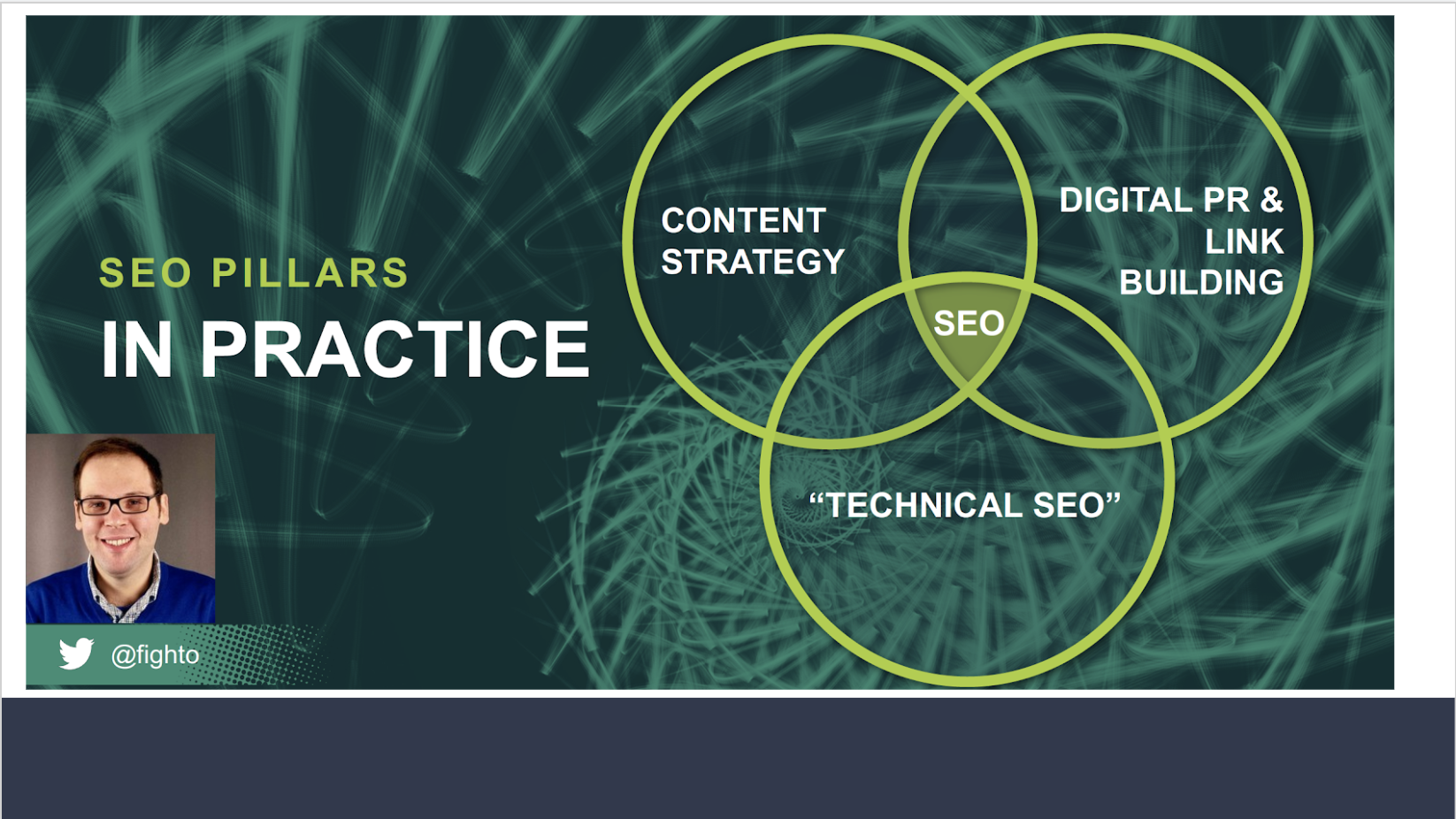
Google is one of the most complex algorithms out there. There's nobody who's going to outbeat their algorithm and the logical scale, you just say, Google has over 100 different factors that affect their algorithm and there's all these different things that can influence your rankings and you hear all these scary things about, five things to not do or stop doing this, or you have to be doing this. As someone who practices SEO at 24/7, I'll tell you there are three primary battlegrounds of SEO execution. I don't want to oversimplify my own field, but generally when I'm consulting, it comes down to these three things. The three pillars are content strategy, digital PR and building Technical SEO. This was a slide I borrowed from Paul Shapiro.
He's a very well-known SEO in the industry. He's very technical, though, if you don't know anything about SEO, you could go look him up always, I can understand because I can barely understand some of the things he's talking about. I want to make sure that if I borrow one of his slides, I pay homage to him. These are the three things that really influence SEO. All these other things, you don't want to be chasing minor signals or minor goals that don't really have the biggest influence. These three things will always come down to whether or not you’re going to be a successful SEO. Anything outside of these three things, arguably, are just variations of these three, or just not that important. I'll go over each pillar today and that's what we're going to be walking away.
We're going to go over the pillars and how they influence the SEO side of things. Then second, we're going to run through some simulations, because what I want everyone to walk away with the SEO side is, I consult a lot with my clients, but also I work with a lot of startups and people who don't end up actually working with me, but I try to be very generous with my SEO advice. Something I find is that, where the internet is great is that everyone can find articles about the top five things you should be doing with your SEO. I can guarantee you on that list somewhere says "Update your SEO title tags and meta descriptions." That's probably something you have read if you've been doing any SEO reading before.
The problem is a lot of these articles you read, these tactics are so right on but out of context and not understand the biggest strategy they’re almost pointless. I've come to many sites where I've seen them. I know what you're doing based on these articles and I never tell them, but I always in my mind, am like, "Well, we're going to wipe all that because that means utterly nothing and we're going to do something else with this." That's what we're going to be going over. Again, it's not micro execution, this is all strategic top level side. This is what internally with my own company, we have these exact conversations about how we're going to be moving forward. Let's go over our first thing.
1st Pillar - Content Strategy
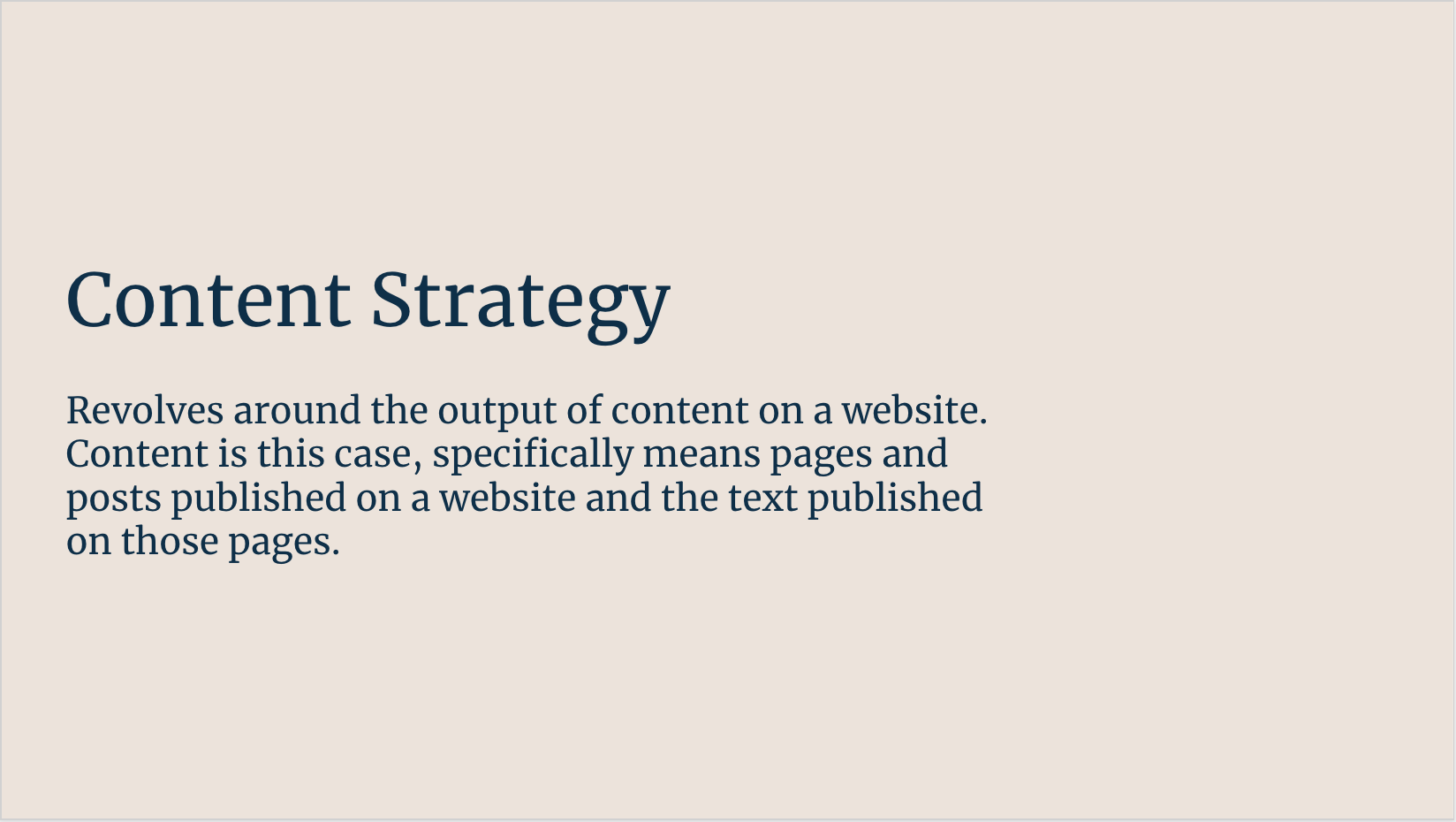
These are three SEO pillars we're going to be talking about. Content strategy. Content strategy revolves around the output of content on website. In this case, it just specifically means pages and posts published on a website and the text published on those pages. Content strategy can sometimes be over complicated. It just means pages on your website and the text on top of them. Now, there is a caveat, videos don't really function well for SEO purposes. I specifically mean texts on a page, not videos. Google's still not the best at reading videos just yet, but that's a totally different conversation.
Just know, if you are a master at making YouTube videos or whatever, and you're putting those on your website with no texts with them, Google almost sees that as diddly-squat, they don't really know what's going on. You need to have text. This can come in the form of a page or a post, it doesn't really matter as long as there's text on the website. Now, content strategy is one that I harp on the most, because content strategy, quite literally is the one thing in SEO that you can actually control. You'll see later on, there's a lot of things SEO that are competition based, very algorithm based, and it's very difficult to be increasing your mark, but then with content, this is actually the one thing that nobody else could control but you. We go into what content strategy.
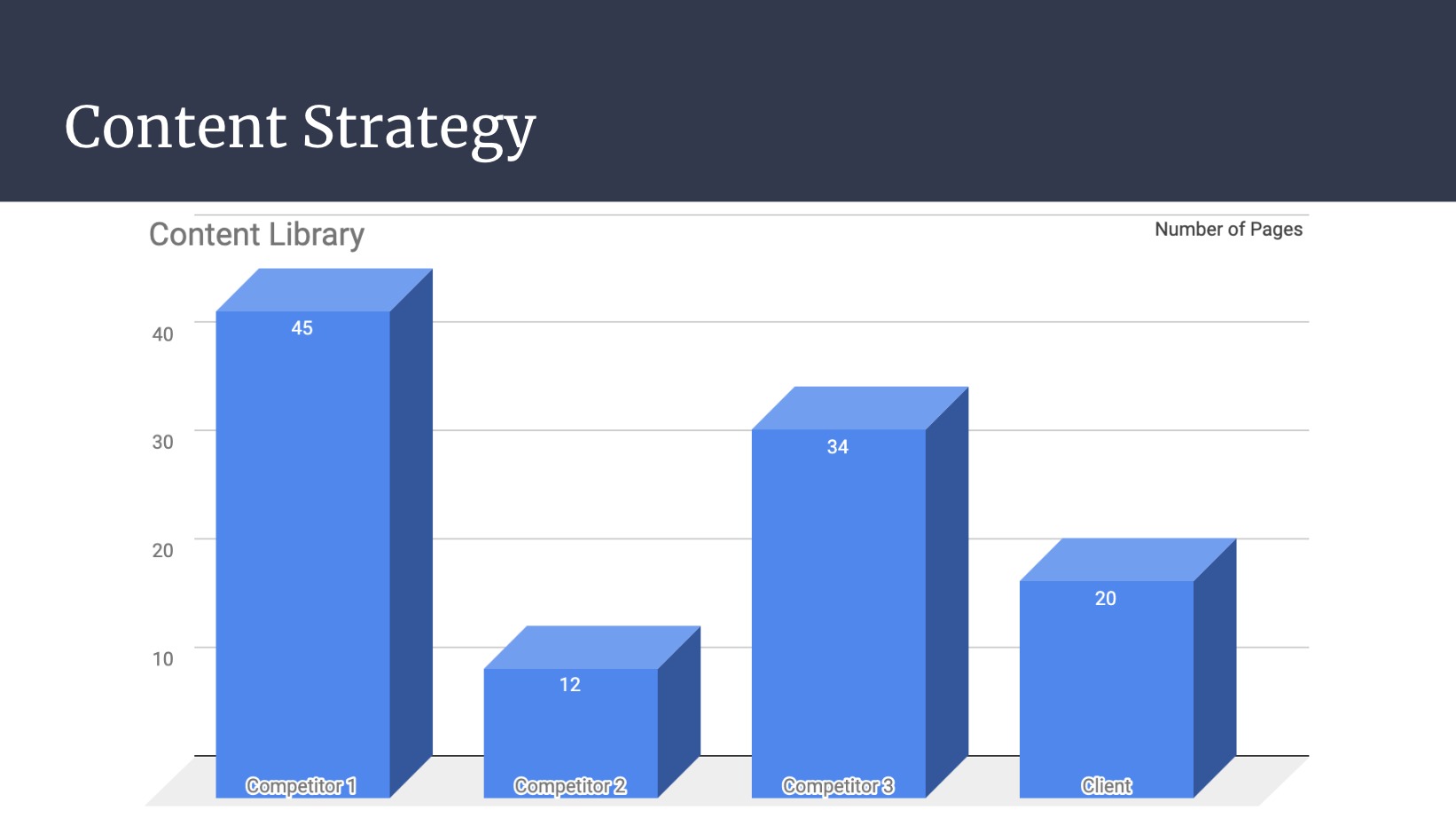
This is an example of a Content Library that we look at with our customer. What I want to show you guys is this is a chart showing the different sizes of different websites. This is an actual chart but I've hidden people's names, what they’re talking about, but this is my client and these are three of our competitors. We're trying to rank for a certain keyword, let's just say pizza. I always use pizza as my example. Let's say we're trying to rank for the keyword pizza and we're analyzing the Content Library. What we're analyzing with Content Library means is we're measuring the size of the content you have on the site. Let's make it very simple, we just have a small Mom and Pop Pizza Shop and our website has 20 pages that includes product pages, blog posts, everything, we have 20 pages devoted to pizza.
Our competitor three has 34, two has 12, and one has 45. Now, the reason why these three competitors are pulled out is because they rank above us right now. This will show us, well, one of the reasons we might not be ranking ahead of these guys is because our content library just isn't as big as them. The reason why this is so important is because content is really important to SEO and that SEO and Google, they want to make sure that when they're returning results, that they’re returning websites that have the most thorough responses because Google is in their interest, if they're going to return a website to you, they want to make sure they have the best answer.
It is not a straight one to one, but generally, the more content you have more authoritative you look, because your library just looks bigger. Of course, there are ways to scan it. If you have 100 pages that are just terrible, badly written, they don't make any sense, this is not going to work. As long as they reach a reasonable sixth grader level, generally I say sixth grade level, you'll do fine. What I would tell this client is, "Though you are doing better and way competitive, I would invest in a lot more content because you are just lagging behind the competitors."
If you think about it from Google's perspective, if you have four websites, and they all have these Content Libraries, this is the size of their site about pizza, if you had to pick one to return to users who are looking for pizza, you'd probably go with the most thorough one. SEO can go down to that almost basic level. Yeah, is there a question?
Question:
Yes. The question is, number of pages versus number of the keyword? Let's say I choose to make the number of pages but a smaller number in terms of content. Let's say, text, picture and something that would be great, so then it’s not crowded.
Is that a better strategy that way then going and cramming information on one page?
Jason:
Yeah, there is no better strategy, whichever one you can execute is fine. I guess what you're asking is, should I make one 2000-word piece or four 500 word pieces? At that point, it doesn't really matter as long as you commit to whichever one you're doing. In isolation, it doesn't matter. What I tell most businesses though, an actual real world execution, I would always suggest the former do four or 500 word posts as opposed to one 2000-word post. The reason I say that is because if you've ever tried to write a 2000-word post, you'll put it off for weeks, because it's just difficult for anybody to write essay, but 500 words. Ever written 500 words it's almost you feel like it's nothing, you're like, "Wow, that was so little."
It's easy to merge four posts into one 2000-word post. Actual execution, I would say, do four 500 word posts, but if we ignore the real world, and we're just looking at SEO, actually, longer word pages tend to rank better than shorter word pages. That is a totally different level. We don't worry about it too much. I'd say most businesses, the problem is not going to be how many words on the page, the problem is, you're just not even getting content out. You're so busy with helping customers, handling your sales calls, you generally won't even get a blog post out. For the people out there who have a website, you probably been there before where last time you updated your blog was six months ago and you hate looking at it because you just haven't got around to it.
Or on a more basic level, maybe it's building a website, maybe even knowing you need to build a website. You just have never got around to it because it seems so massive. In terms of execution, I always go the shorter route. Any more questions? Cool.
Anyway, content strategy on that one pillar, at its basic form, it's just measuring the amount of pages. What I want you guys to think is that wherever your website is, or your company is, there is going to be a layer of you having to fight against your competitors. If you're going to start a new company, let's use an auto insurance. Just because you have five pages about auto insurance, why would Google rank you higher than Cal State Fullerton where they probably have tens of thousands of pages.
There is a layer of scale that you have to input to put you on the right pace. It's almost like a sport, you score enough points. Content is very... If you control how much content you have, and bigger your libraries it's going to be best. This is something that I feel like a lot of people overlook, and it shouldn't be overlooked. I get a lot of people who tell me, "I don't want to rank ahead of our competitors." I look at their website, it's a one page, homepage, and there's nothing else. There's no blog or anything else, just one page. Their competitors have entire libraries of 10,000. I'm like, "Why would someone rank you above them?" There is a layer of you need to invest in content.
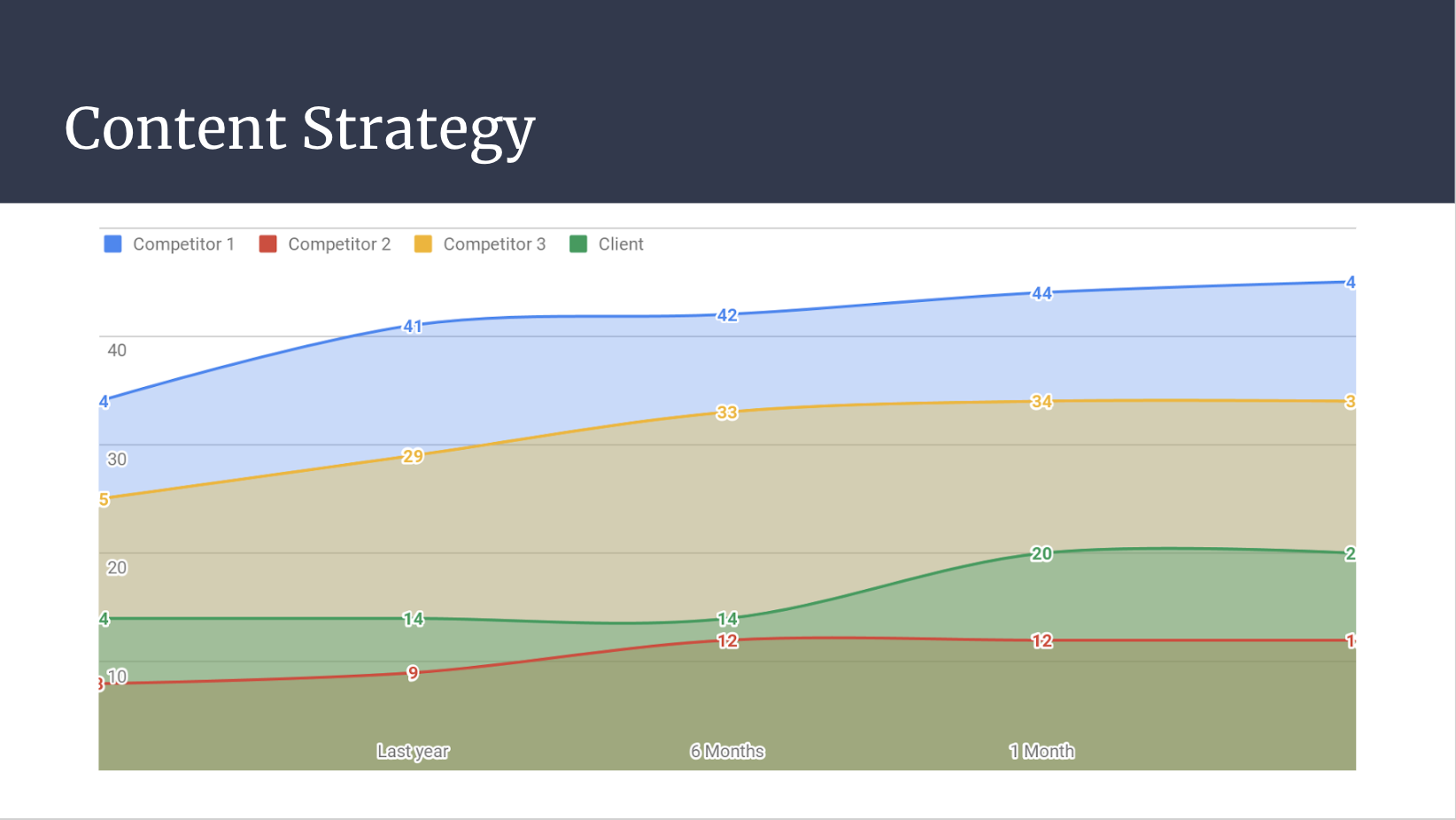
If you want to get even more technical with it, this is a chart showing those exact four players, the rate of growth of their content. You'll see in the top one, this competitor over here, started around 34 then at six months they had 41. The next six months, they went to 42, and the next six months, they went to 44. They average about one to two blog posts a month. If you can see that from your competitors, they average about one to two new pages every six months they're adding, you can add one to two pages. The problem is, I believe we are green right here, we're green. If they're adding one to two pages every six months, and you're adding one to two pages, every six months, you're already about a quarter of them and you're never going to catch up.
As an SEO tactician for your business, you can't be going at the pace that your biggest competitors are, they are adding it one to two every six months for you, you need to register... Not only are they devoted to you, I need to beat them but I also need to cover the spread. I probably need to be doing six to seven pieces a month to be able to match their Content Library. That make sense? When you're adding content, it's not about, "I just added one blog post, that's great." What if your competitor puts three a month? If you do one a month, you're actually going in the negative because your spread's getting bigger. When you're doing SEO, there is a point to see how much content and page they're putting on a month by month or six-month basis.
Question:
How long should some of the blogs be? Should they be a couple of paragraphs or what?
Jason:
To me, if you really are just strapped for time 250 words is the other floor, but I want to say 500 because it is a good one.
Question:
I'm looking at strictly HTML pages or do all send links to other forms, PDFs and...?
Jason:
It should be more HTML. PDFs do count, but Google doesn't like PDFs because PDFs have terrible user experience online. Generally, HTML. If you add 1000 images, and they have their own URLs, it doesn’t really count. It's more HTML pages. Yeah.
Question:
I don’t know if we'll be covering this later, but what about websites or companies or pages that have Instagram integrated, that have YouTube integrated? I know, for example, some people they were really trying to push making YouTube videos. How does that impact your blog posting because you mentioned text but those videos...? That is a text.
Jason:
Yes. Great question. I promise I'm answering your question but I’m going to leave it that way. We are reaching a point where SEO has a weird divide with modern day marketing. Modern day marketing is very video driven right now. I think I mentioned in the beginning of this, this part, Google doesn't read videos well, if you've ever had auto captions, they're just awful. Even if you have a 30-minute video on your website, Google will read it, but they’re not going to understand it. They're just going to be... All they see is that embed code. They can't read the actual video. What I tell all my clients, if you're going to go for like a video strategy, it almost voids if there's no text with it. Get the transcript of the YouTube video and then put it on there and then you're fine.
I'm going to give you an example. One of my longest lasting clients is a video production studio, and they have been in business for 16 years, they have one of the strongest brands of Orange County, and their website was full of videos, but no text, because they have these beautiful videos. They weren’t ranking all right. When I got their account, and I started working with them. We started adding transcripts, adding text to it, and now they are the top ranked video production studio. I don't want to oversimplify, but it was mainly a content strategy and this actually adding supplemental text to your videos. Because otherwise... It's funny.
No one wants to admit. I had to tell the client that sounds like essentially Google when they see your site, you’re a big production studio, it makes sense for you to have videos, but your entire site looks blank to Google. They just see it as a blank site because it's just a bunch of embeds from YouTube. Instagram, anything, those are fine as well. They're iframes and they're embed files, it's best to have your own text. If it's an embed file or iframe, they're not going to get... When it's iframe, they're going to give that content value to the iframe and not your website. They're going to understand, this content is from Instagram, we're not going to give credit to your site because you’ve taken it from Instagram. Yeah. There is some layer of making your own content with it.
Question:
How does DuckDuckGo operate? Some people may not want to use Google.
Jason:
Yes. Unfortunately, my presentation is primarily with Google focus, but DuckDuckGo, generally, and from what I've seen in the industry, it's very new. There's not a lot of info out there. It's generally the same practices in Google are with DuckDuckGo.
Question:
There's no recognition of video?
Jason:
No. Because if DuckDuckGo figured out recognition of video, we would know, because then that would make them orders of magnitude better than Google. Then Google would be doing some corporate espionage trying to figure out that. Yeah.
Question:
How important is it that the content that you have like the text is completely original? For example, I had an idea for one of my site's articles and publish by other people but if I find any interesting article, would that contribute to ranking or would that happen to be more original, whatever your avenue?
Jason:
Yeah, good question. A lot of companies do this. They syndicate content. There is a way to do it right and most people don't know how to do it right. If you're just copying and pasting onto your website, it's actually a negative. Google may actually blacklist your site. I don't know how technical you are, but you have to add a canonical link in the back end and the canonical link will tell Google like, "I am literally copying and pasting this onto my site, but the original is this page." You can tell Google that. Therefore, they'll understand you're duplicating the content. In terms of actual value to you, it's marginal. It's good because you're adding stuff, but Google's not going to give that much credit because they know it's copied.
They're also not going to hurt you because they know that you could credit but it's not a sustainable long term strategy, you need to at least have your own content.
Of course. Is there any questions about this slide? Again, this one is about the rate of content growth. We all good? Okay. What I would say in terms of actual execution, is that, what I want you guys to walk away with is when you get home and you think about your SEO strategy, I want you to be able to have a short and long term strategy to run. What you want to start analyzing is how many pages are your competitor's site, and then you need to start creating content goals. This isn't an actual real content link, that I have with a client, we need to hit 40 more pieces by the end of March. Now unfortunately for them, that's five a week, that's a lot, but if they have big dreams, a lot of startups, they say their runway is six months, eight months, you need to move quickly though.
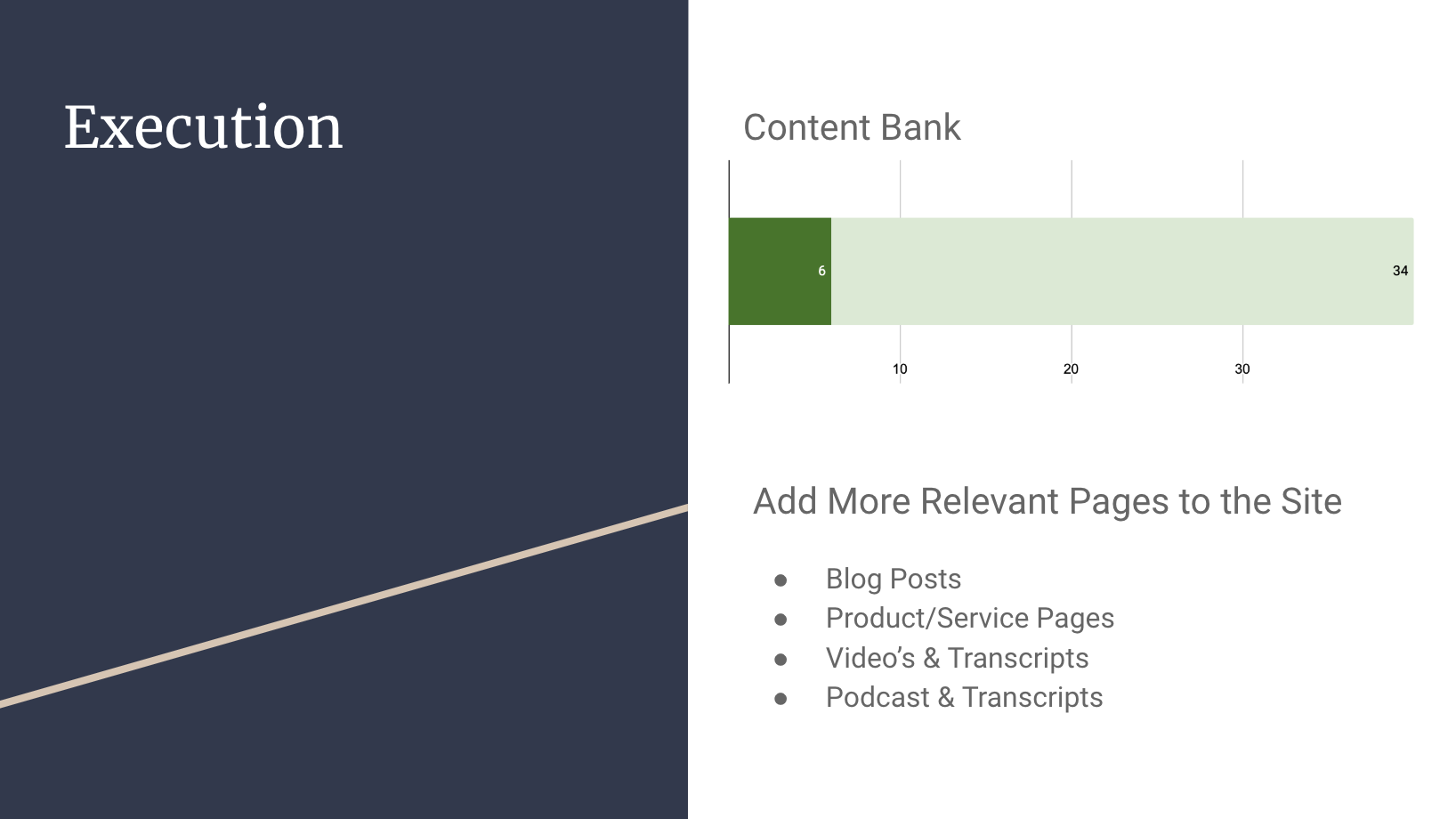
You got to scale your content as fast as possible. When you're seeing this analysis, this is the execution part of it, you see that your competitors are doing two a month, but they have 20 more pages than you. You might need to do five a month to catch up with them in a six-month period. That's what we need to think about content and execution is add more blog posts, add service pages, videos and transcripts and podcasts and transcripts. If you really don't mind writing, one of the easiest hacks is to just use video or a podcast. I think a one-hour video or podcast is 10,000 words. If you've ever seen 10,000 words, it's a lot. If you really don't want to write, I think 500 words is like a minute of talking. It's like nothing. What we do tell clients is that...
I've seen a couple of clients who they do a lot of interviews, but can't write very well. We just take all their interviews, transcribe them, that's their content. Let's go jump to the next pillar. Does anyone have any questions about content? Yeah, I want to finalize content, that content is so important because it is what you can control. Yeah.
Question:
Does it favor WordPress or any particular platform for blog posts?
Jason:
No. Not really. I think at that layer, there's just execution. Yes, like some CMS or others on the technical aspect, but I think for SEO purposes, the number one inhibitor of content strategy is getting content out there. WordPress is pretty easy to publish a blog post. That's fine. Generally, it's only a problem if your CMS, you have so many parties that it takes a week turn around to get a blog post out. That's when that might be a problem.
Question:
How about this one. If the short term goals is to get to same amount of posts as your competitors, what are the long term goals?
Jason:
Long term goals is to continue to stay ahead of them because this is what a lot of people don't remember with SEO, is that when you do SEO, SEO is competitive by nature. You're trying to be the number one ranked. Someone's there right now, someone has number one position, and what often happens as I feel like when I work with a lot of people, we spend six months to a year to a year and a half, we get them to the first spot. They're happy, pop champagne, we got it, we're all good to go. Your competitor is probably pissed off and usually what they do is they hide the CEO company, and then it becomes almost like a video game. Essentially, you're now at the final round, hence forever essentially.
2nd Pillar - Linkbuilding & Referring Domains
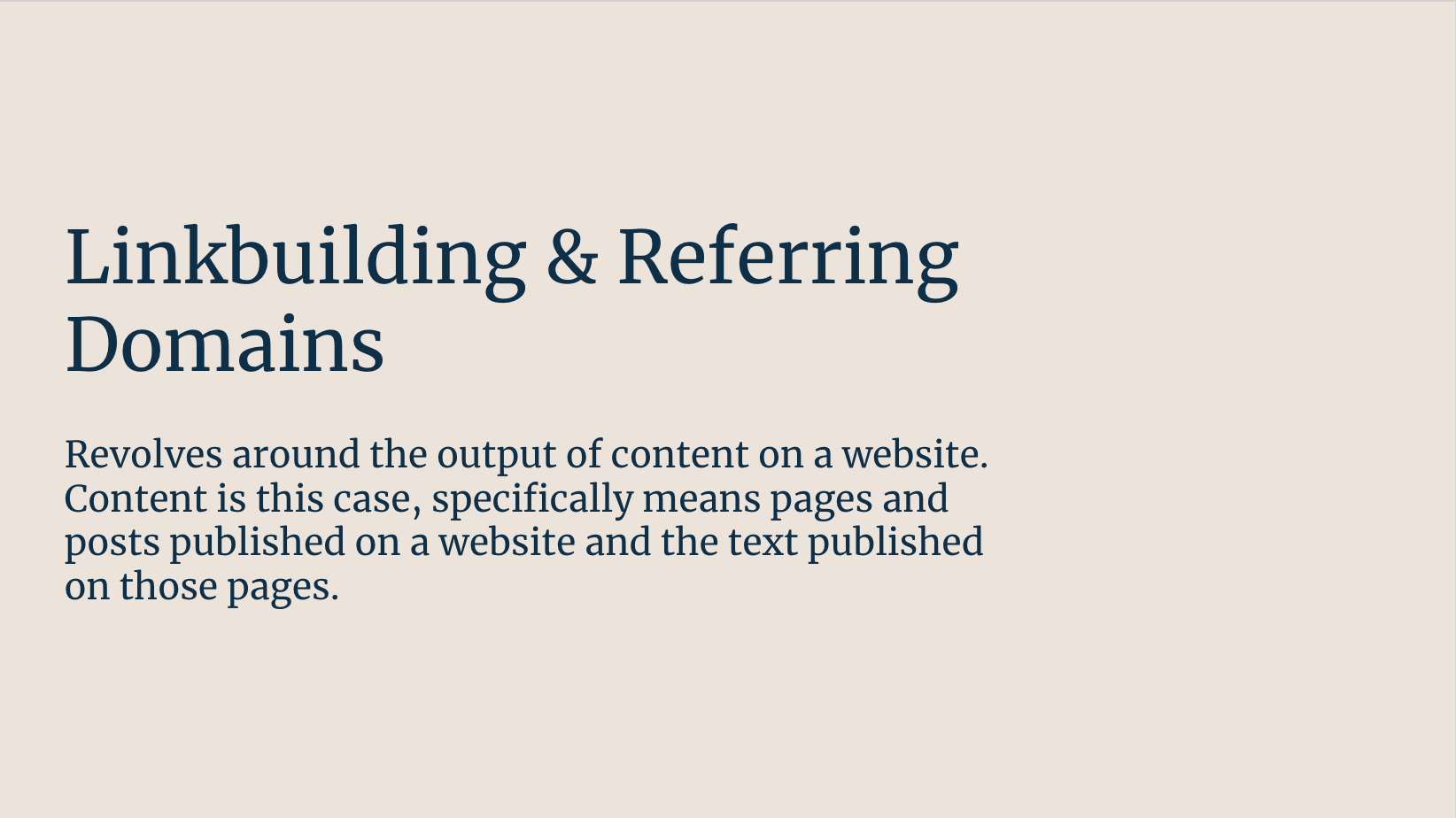
I would say the long term strategy is surpassing them with content and then maintaining that. Cool. Let's talk about the second pillar. This is the pillar of SEO that gets all the attention. If you've ever read stuff about SEO, it's probably about this section. That's probably because it is the hardest part of SEO, where I talked about content, content is directly in your control. This is definitely not in your control. This is the holy grail of a lot of SEO campaigns. When building in Referral Domains links and SEO are almost synonymous. They're just so important for each other. It revolves around... Actually it's the same definitions so I’d rather change that there. Linkbuilding and referring domains revolves around driving links to your website.
How many links are you getting to your website? If I have a website, Chris, you have a website. Chris please raise your hands because I’m talking about you, and you have a website and sitting next to him has a website as well. My website gives both of those guys' websites a link, that's a link to them. That's what you want. You want to get more links back to your website. The reason being a link to your website is seen as an endorsement. The example I like to give is if you move to a new town, and you went to your neighbor and said, "Hey, I'm new here, what pizza place would you recommend?" You go to every neighbor on the block. If all 10 of them say, The Pizza Hut, you're going to go to The Pizza Hut.
If nine of them say Dominos and one says Pizza Hut, you’re going to go to Dominos. At a very basic level, that's what links are. Links are just seen as endorsements. If we have two pizza websites, one has 1000 links, one has 100 links. Google feels more secure with the 1000 linked website, because they see as there's more endorsements to that website, therefore I can trust it better. We can go down the path of not every link is made the same. For example, a link from the New York Times food critics, new website is much stronger than Joe Schmo's blog or anything. Generally, just like content, the more links the better. Now, what referring domains are. This is, I don't know why I won't say big kept secret, but it's a well-kept secret, but referring domains are actually more important than linkbuilding.
I don't know why linkbuilding gets all the attention. The difference between referring domains and linkbuilding is pretty simple, actually. If I have a website, and I'm linking to another website, I'm giving them one link. But let's say I'm trying to spam the system. I know Chris, he's my friend. If he profits, I profit because we're buddies. The more he makes money and the more beers he'll buy me or whatever it might be. If my website gives Chris 1000 links, he just got 1000 links from my website, it's only one referring domain. Because the domain can give 1000 links but it's only one.
The real value of SEO actually is the more referral domains you get. Yes, getting 1000 links from one website is great, but 1000 referring domains is much more important than 1000 links, because it's much more difficult to get an additional referring domain, than an additional link. Does that make sense? Does is not make sense to anybody? Because it's actually really important to understand the concept.
Question:
It is because the referral deals with different sources?
Jason:
Yeah, it's much more difficult to go to different websites and get a link than it is to go to the same website to get more of the same. It is shown in studies that let's say I wrote for Entrepreneur Magazine, that's a very good link to get. Every subsequent link I get entrepreneur.com gets weaker and weaker to my site. It's not that you shouldn't do it, you should still go for it because you’re still strong but they get weaker and weaker. If I went to entrepreneur.com, and then let's say go to inc.com that's even better value because it's seen as a different domain. The reason why this is so important is because referring domains is generally what really moves the needle for any SEO for a website. You can add a lot of content but referring domains truly is the main driver of an SEO campaign.
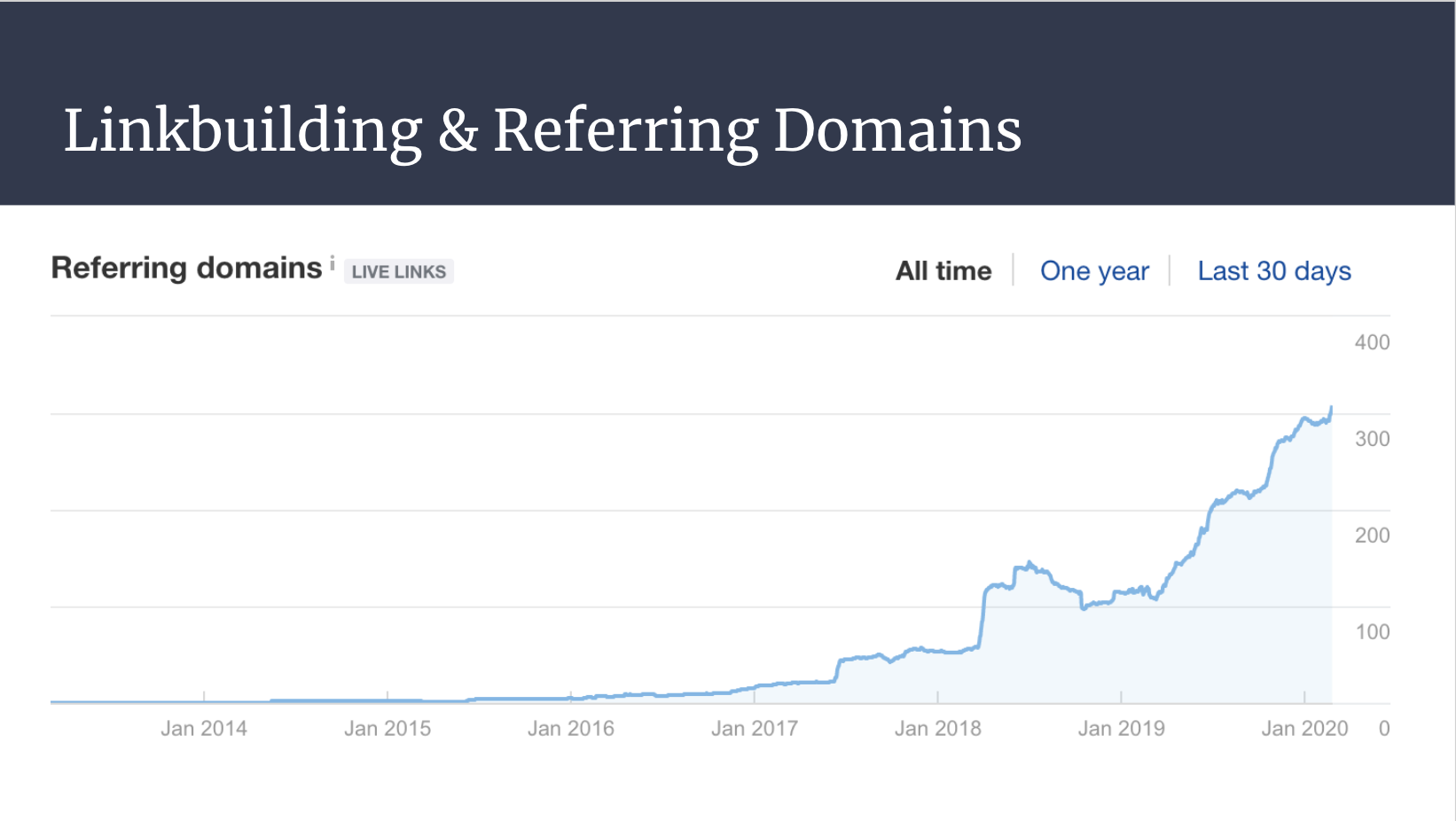
This is a sample chart of websites' overall growth referring domains over time. A good SEO strategy is where you see one like this, where in a one-year period you'll almost double or triple. You see, in one year, they went from about 50 to about just above 100. Then in that one year, January 2019 to 2020, they went from a hundred to 300, they tripled in size. That's exactly what you want to see.
Question:
Not to pick on any particular company, but let's say GE, multiple businesses each with their own website. How is that counted? Is it still considered one source because of the company or it's a different domain because it's a different website from the same company, maybe even in the same division, different websites?
Jason:
Yeah, good question. How SEO operates is it all comes down to the URL? If it's, let's say I'm going to use fullerton.edu. fullerton.edu is Cal State's website. fullerton.edu owns a lot of sub websites. I think they own business.fullerton.edu, business.origin.edu and fullerton.edu are kept as the same because they’re seen as same domain. But let's say Cal State did it differently for every college they did fullerton.edu, business.fullerton.edu, those are treated as two separate entities, even though the same company might own them in an SEO world, there's no way to verify. They just go by domains.
Yeah. This is what you want to see on our referring domains chart, you want to see that growth. Because I'll tell you, this is actually my client's website, I joined working with them around this period, around March. In March, we were here. They were not ranking for what they needed to and this company is a software development company. They were not ranking anywhere where they need to in the Irvine or Orange County District, they wanted to rank for software development company. By increasing their referring domains to about 300, we were able to get them onto the first page. Referring domains really drives that needle and if you had to pick one thing you wanted, referring domains is the one thing. That's really what you want for your website. The question is just...
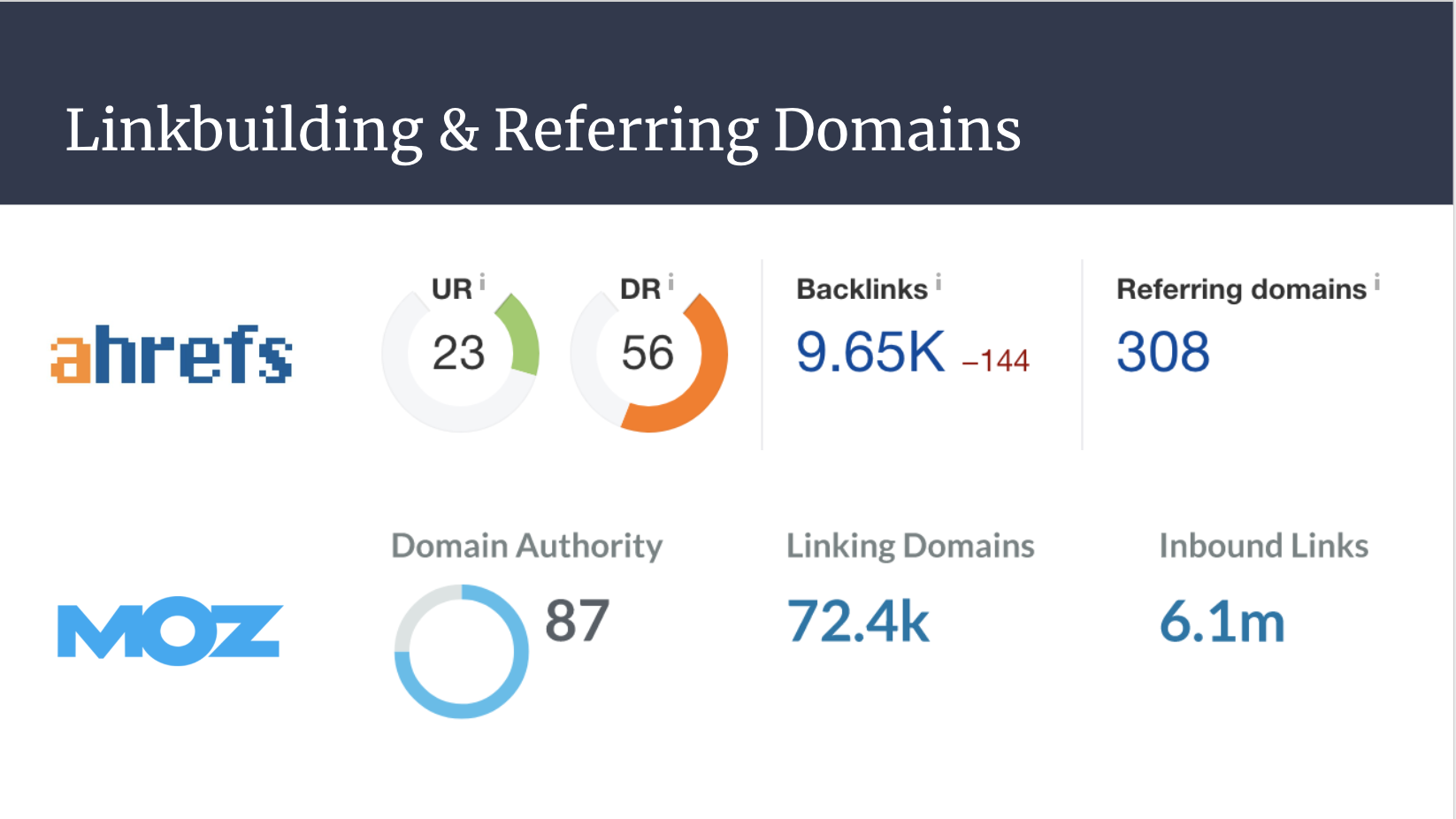
Anyways, linkbuilding and referring domains. There's two websites you can go to Ahrefs is my personal choice. I like Ahrefs a lot but a lot of people know Moz and Moz is fine. I love Moz. They're a great company. You can use either or but they generally are the two speculative websites you can use. They're both not free anymore. I think Ahrefs is definitely not free but Moz used to be free. I don’t know if they’re free anymore but these are websites and softwares you can use to see how many referring domains and links you can probably get. This is a look at the sample, one of my clients of their backlink referring domains and this is utterly made up. I don’t know what site this is. This is taking Moz's images. Any questions about this?
Question:
What about Alexa Toolbar?
Jason:
Alexa I feel like is a legacy from the 2010s and before but I think Alexa is seen as an old... It's like a Dreamweaver you’ve left aside. It's outdated now. I don't think anyone really uses it. I don’t know if you know Dreamweaver.
Any questions about that? Just like I mentioned earlier, I just want to clarify, you see, backlinks are from domains. Usually your backlink count is exponentially higher than your referring domains because that's exactly what we talked about. It's easy manipulating backlinks, the big number to look at referring domains, Moz has as linking domains because you have 6.1 links coming from 72,000 referring domains.
Question:
I’m curious, how does the domain reputation factor in, is it just the number of domains as they get few?
Jason:
Yeah. That's a great question. Domain authority's influenced heavily by the amount of links you're getting. Also, the quality of your content, but it truly just really is the amount of links coming into your website and the quality of them.
Question:
What's the quality of the links coming from Facebook or Reddit?
Jason:
Links from social media are utterly valued. They're so easy, manipulatable that when you get a link from Facebook, we call those no-follow links. That's what Google calls it. There's follow and no-follow links. A no-follow link tells Google, "I am linking to this website, but I'm utterly not endorsing it. I'm not getting any value; I'm not endorsing it." All social medias are a no-follow. If you have 10,000 links coming from your Facebook to your website, they don’t mean anything. They just don’t mean anything. What I do want to clarify, though, is when I say that people think, does that mean social media is utterly worthless?
No, the link is not of any value, but you're getting traffic from that link then there is value because the more traffic you're getting, the more Google sees that, the more it is better. To think that it's a causal relationship is not right. It's more like a secondary benefit rather than actual value. If you're curious about why no-follows exist, the real reason no-follows really existed was, let's say the days in Enron, we want to talk about Enron, and you're amazing Financial Times publication and you are the best here and that's supposed to be credibility, and you're linking to Enron that will literally destroy your credibility as Google sees you are linking to a scam.
Well, the reason, that's why you implement no-follows so that publishers and websites could say, "I want to talk about this scam, but I'm not associating myself with them." No-follows are now evolution to social medias like Reddit, Facebook, Instagram, where they’re automatically no-follows. That's not something that you could change. Google just automatically knows it. The real link referring domains and links you want to get are generally wherever you can get them as long as they're not spam. Generally, the definition for not spam means you can tell. If you look at a website and you’re like, "This is clearly a spammy website, probably you shouldn’t be putting links on them." The best things to get are industry relevant and from high authority websites.
Industry relevant can be as simple as if you're a restaurant, you probably should have a listing on Yelp. If you don't have a list on Yelp for your restaurant, that's one thing but links on... Yelp, I would argue, is more of a restaurant directory than anything else. It behooves you as a restaurant to have a look. If you are a lawyer, it is good to have your listing on Super Lawyer or any of the lawyer directory websites are there for that. Every industry has their own directories. In the agency world for marketing, we have a directory. We have Clutch, App City and you can go down the line. Even universities have theirs. It behooves you to do that and then the holy grail is always if you can be getting links from an Entrepreneur Magazine, Forbes.
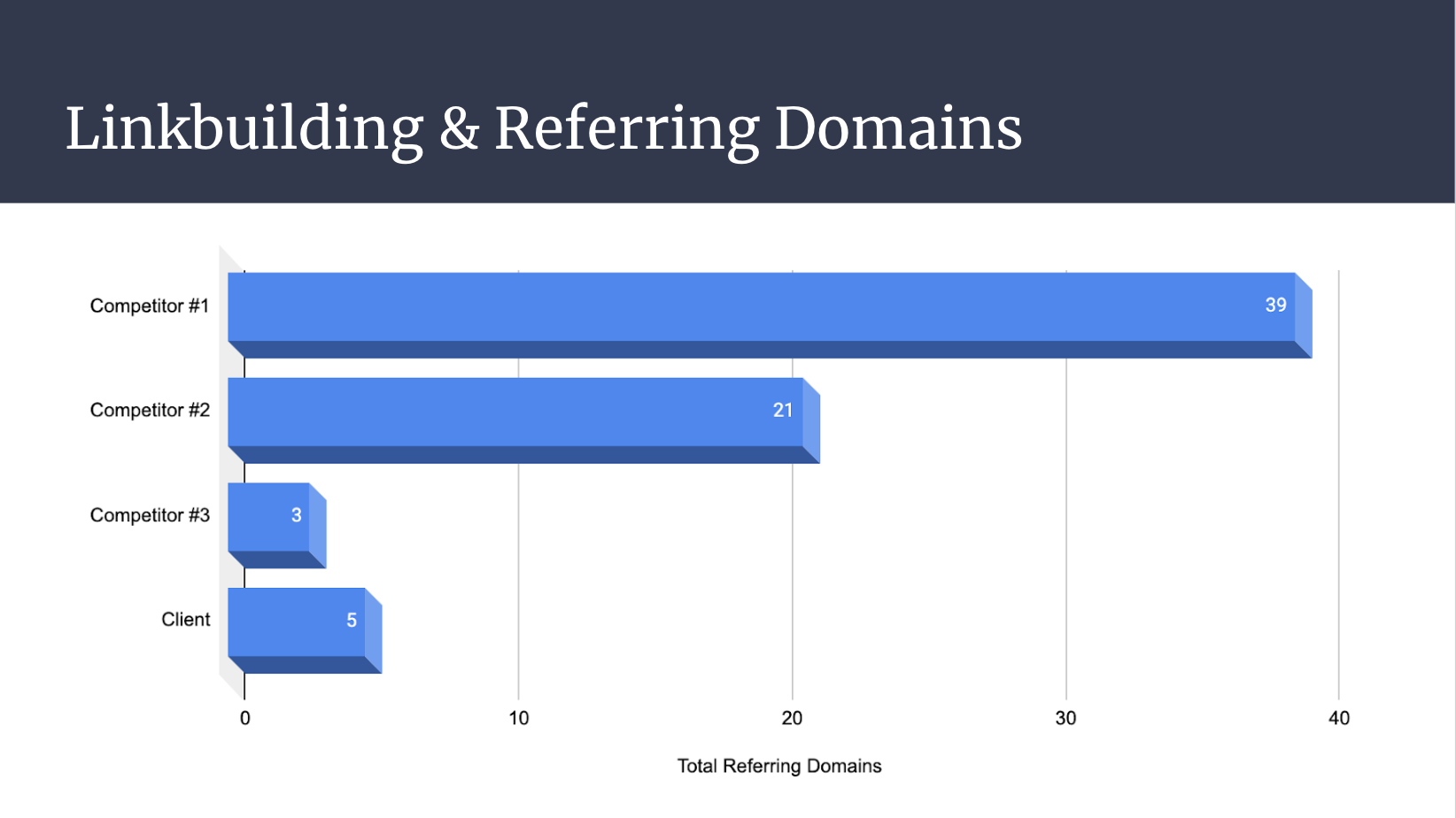
This is a different chart that we also analyzed for clients. This looks at the linkbuilding & referring domains spreads. This is the same client actually that we showed earlier but again, our things are hidden. We're going to make this very simplistic pizza shop again. We have five referring domains coming to a pizza shop, number of competitor, one and two, had 39, 21, and three. This is almost like in direct order of who's doing best. Competitor, one, two and three, they are order in who ranks best, number one, two, and three. One has the most referring domains, two has the second most, the third has three. This is where SEO sucks. Sometimes you can have more referring domains than someone, but you still don't rank above them.
That comes to call everything, maybe you just build links on small directories, but the three he has is from Forbes, Entrepreneur and Eagle. Something like that. Generally, this is what we use to figure out what we need to do. I was looking at this client, I tell them, "Even though you're better than the third place, you still have a long way to go. We probably want to hit more like 20 to 25 different domains to give you a better shot to rank on the first page. Because if you got 20, 25 you'll probably surpass competitors." What you're going to start doing in terms of execution, citational directory links, Clutch. There are a lot of articles you can find online really easily that say like, "150 directories, to put your website on." You can go do those. I won't spend too much time on those, it's marginal benefit, but if your website started fresh at zero then do that.
If you are a legacy company that has been in business for 10 years, I'd argue it may not be worth your time. Industry specific links, we already talked about that. Try to do it within your industry. Topical authority contributorships. This is where most companies stop. Most companies build links and they stop here, because it is very difficult to get topical authority and contributorships. It's like me saying, "Hey, I want you tomorrow to go to Orange County Register and write for them." Not as easy as getting a directory. This is really where if you get links from these places, it really starts to move your site to a good place in linkable assets. I have a screenshot example on the top. This is my media production studio.
I'm sure Torrey's not going to care that I’m using this space, you can go look him up, he'd like that. We got him on HubSpot. He wrote a post for HubSpot, and this really helped drive the needle up for all of his rankings as well. A goal you should have is that go to high authority websites in your industry and find a way to write. That presentation and that topic is a complete different presentation, like an article it'll take months and months, but that's the goal you should have. I can always do the presentation in the future but how to get those, this is what you really want to be getting. What linkable assets are, I'll define what linkable assets are. If you can do linkable assets, you can skip three of over. Linkable assets are very difficult.
Linkable assets are things like, they must be articles where your state's favorite reality TV show, making things that people will genuinely just want to link to on their own core. Because the problem with stuff like this, these three right here you have to manually do the on your own. You have to go build a link or write contributorships topical authority, you have to go be an author or something of that sort. Linkable assets, it's like the dream of making passive income when people say, "I want to make money while I'm sleeping." That's linkable assets. We want to get links in your sleep. You want to write such a great piece that people will link to it without you needing to tell. For example, is 06:00 PM reality TV show, that's a good example of a fun pop culture one.
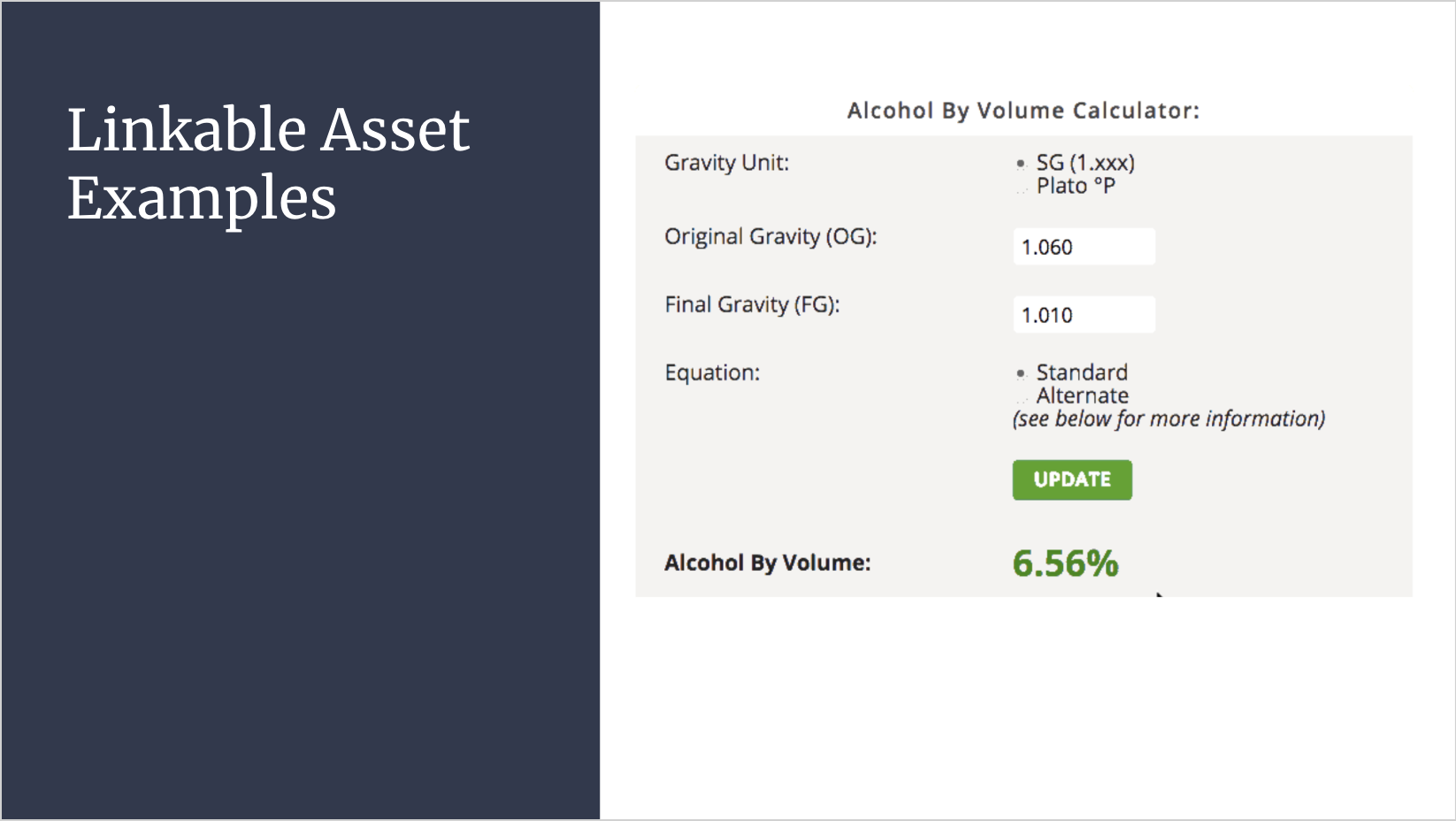
One that you're probably all familiar with and you've seen before, is stuff like this. You've all seen categories like this. Usually it's the different mortgages or savings accounts. This is what I'll call my volume. I don't know how I found this. Actually, I think I thought this was a mortgage calculator when I did my last presentation, and it was not. Calculators like these are very popular to be linked to as well because a lot of people don't want to calculate on their own even though this calculation is probably really easy. I just have to input numbers, and have the answer come out. These are linkable assets. Things that people genuinely want to link to. If you want to delineation between linkable assets and normal assets, 99.9% of the content you put out nobody wants to link to.
That's just how the nature of the world is. You need to create tools for just something so entertaining that everybody wants to be linking to. This is an area of SEO, that I'd argue if you're starting out, I wouldn't suggest going down this route, is a very, go big or go home. What I mean, go big or go home, if you swing and miss and you’re a startup with a six-month runway, this might actually bankrupt you because this stuff takes a lot of time. If you're going to do a calculator, you have to develop that, you have to get a web developer and build this out there. You have to spread the word about your linkable asset, tell journalists about it, and they want to link back to you. For the stuff like this creative stuff, how many times in our life have you been like, "People will love this."?
Just put out there, people are like, "meh." These are very risky things to do, I would only do this if you have the assets to come with your marketing team or your company is willing to take the gamble. I actually have consulted with clients where we can go two different routes. We can make easy incremental wins, we can go for topical authority, continue writing blog posts, or we can swing big or miss. Most of the times clients will say, "Let's just go incremental, let's not go for everything." Because you don't want to spend months on end developing something, just for it to not work. I will tell you a success story of a linkable asset that did work though. My last agency, we worked with veterinarians and if you didn't know veterinarians have very depressing jobs.
A lot of people think veterinarians have happy to lucky lives because they have puppies and everything, but actually, I know in Australia, veterinarians are the number one professions for suicides. I think in the US I think they’re third or fifth. It's a big problem for veterinarians because the problem is, as long as the Asia and veterinarian industry, and if you love animals, you have to put down everything you love. The reason why I'm talking about this is the other aspect of it is your job is to save animal lives, but veterinarians are often attacked a lot on Yelp and reputation management software on Google My Business, they're often attacked. One of the linkable asset strategies we had around in my last agency is we decided to analyze all of Orange County's reviews.
We analyzed all the five star reviews, in Orange County veterinarians, and all one star reviews for veterinarians in Orange County. (Shameless plug but those interested in local SEO in Orange County I recommend you read our Orange County SEO Guide). Then we published a study saying, "One of the top reasons for one star reviews and we're on top as if five star reviews." It was actually pretty successful because we pitched it to different journalists and we actually got invited to do a national circuit of speaking at conferences for veterinarians about it. When you win, you win big, but I've done a lot of linkable asset strategies where I spent months just for no one to ever pick it up. There is this level of understanding of what you're committing to. That's linkable assets.
Content & Referring Domains
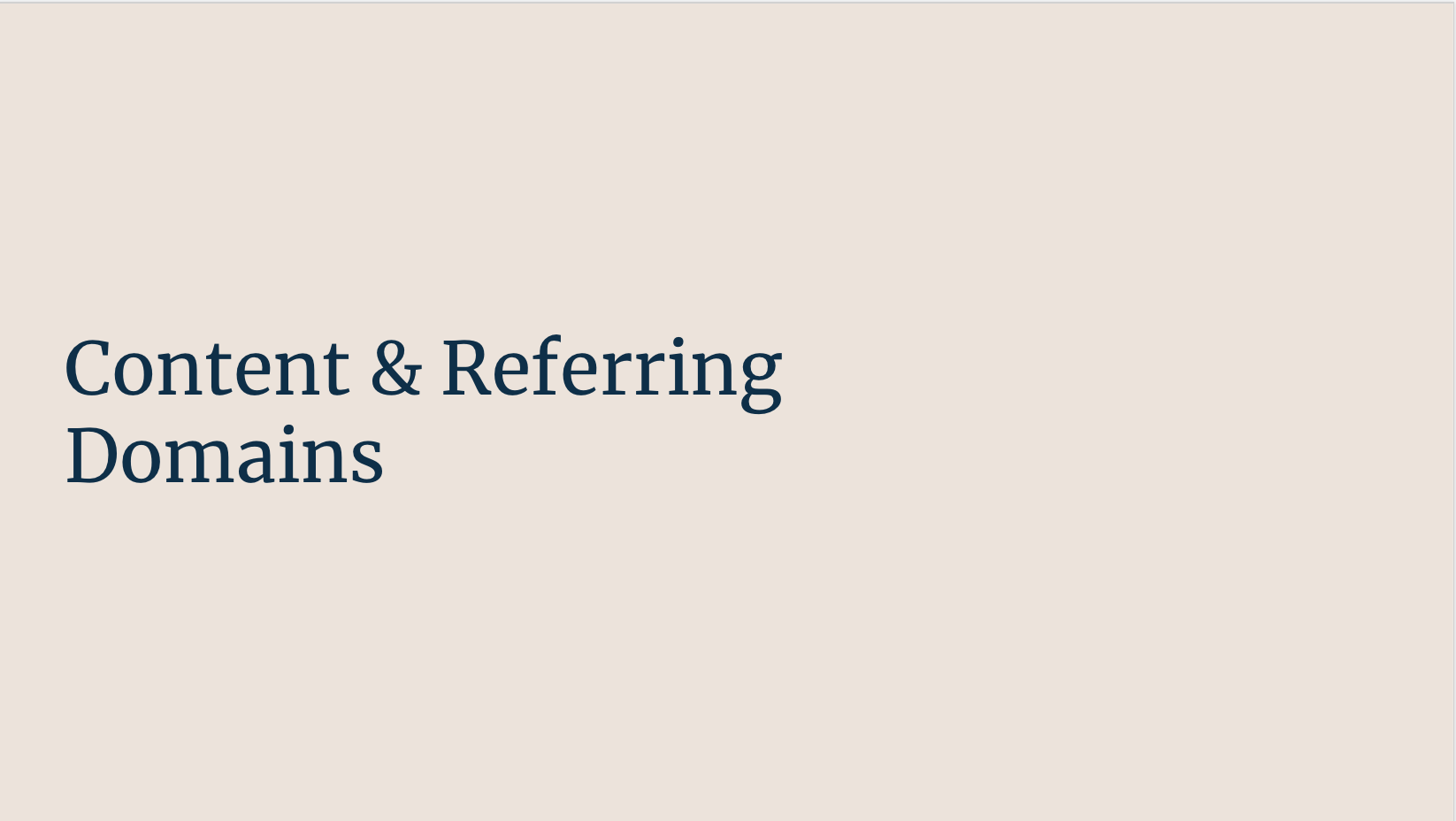
What I want to do is take a pause and understand these two variables. Content, that's the size of your website.
You can directly control that. Referred domain, not directly in your control, very difficult, but it really moves the needle. What we do with most of our clients is most of you in here, your SEO strategy for the next three to five years will stay here content, referred domains. I'll explain later why but what you want to do that because when you're analyzing what the strategy for your website is, this is a combination of the content library, and the referring domains. You want both versions.
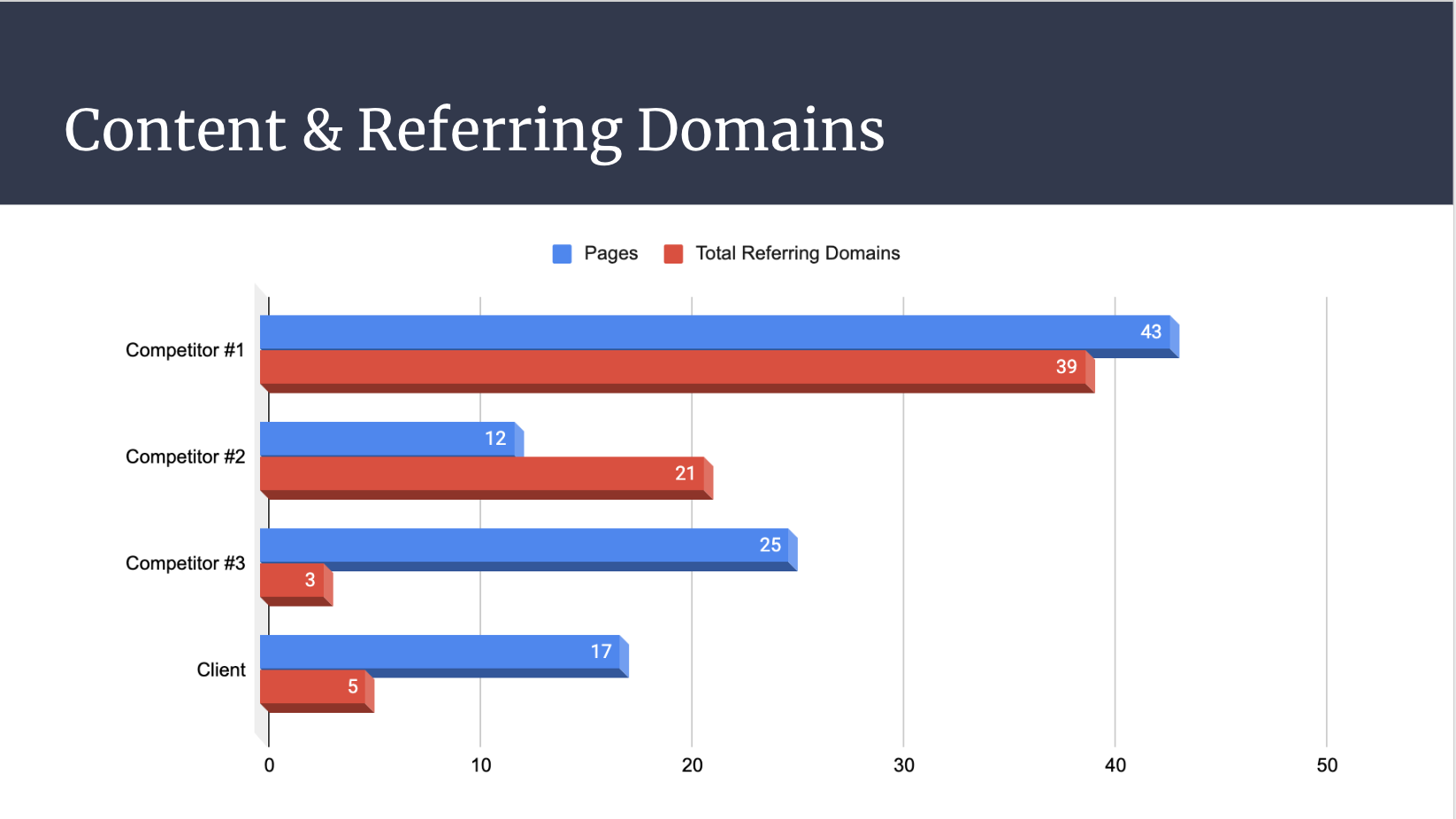
This is the same two clients put together here on this chart. We can live analyze this. This is what I do with my clients. This is how many pieces of content, what does your pizza get? We have a pizza 17 and five referring domains. Number one competitor 43 and 39.
That's probably why they’re ranking number one. They not only have the biggest content library, they have more links and referring domains coming in. It's just that simple. This is where I say SEO can get over complicated. You can change your tags, you can add more keywords on the page, but they literally triple, almost triple your content and they are seven X to eight X your referring domains. No matter how many times you change the keywords in your pages, it’s not going to matter. It's about that spread. This is why it's so important about the pillars, what I said earlier, it always just comes down to this, it does come down to content and referring domains. Let's analyze this. Competitor two, why are they doing better?
They have less content than us but they have way more referring domains than us. Competitor three is the exact opposite. They don't have a lot in front of me, but their library is big. For us as client or us as a team, what's our strategy? We can pick one or two ways. We can go for more content or we can go for more referring domains, we can do a mixture of both, but this gives you understanding. I would tell you there is no obvious answer right now because it depends with the business. If your business and you've been in the industry say 20 years and you know every journalist in the book, wouldn't go for the referring domains one because you know that you can get referred domains.
If you're, and unfortunately most companies are in this situation. You are a new startup or you’re a small business, humble beginnings, you don't really know that many people, content's your way to go, because that's the only thing you can be able to control, you can try to get that to 45. You would then need to create 43 minus 17, that's 26. Right? 26? You need to get 26 posts, that's about if you want to start being on the same pace as your competitor overnight because you don't want to wait six months 26 posts in one month is about six to seven a week. Blog posts every day, doing all that kind ofstuff.
Question:
At what point do you lose your consumers interest if you are oversaturating yourself?
Jason:
Great question. That's the weird thing with SEO. SEO has this weird thing where SEO is not for consumers it's for the algorithm. It's like people when you watch movies, they're like, "Wait, obviously the guy was innocent, or the legal system doesn't care about what's obvious. They care about a couple of laws in the book." As soon as we're going to end up like, "Who's going to want to read the blog post?" Everyone's going to be like, "I don't care." As long as you have a big library. It's one of those things. The nicest way to say it's it doesn't matter. It doesn't matter if they’re going to read it or not. This is a great example of a live client I actually have right now, this data was taken two months ago of the situation.
3rd Pillar - Technical SEO
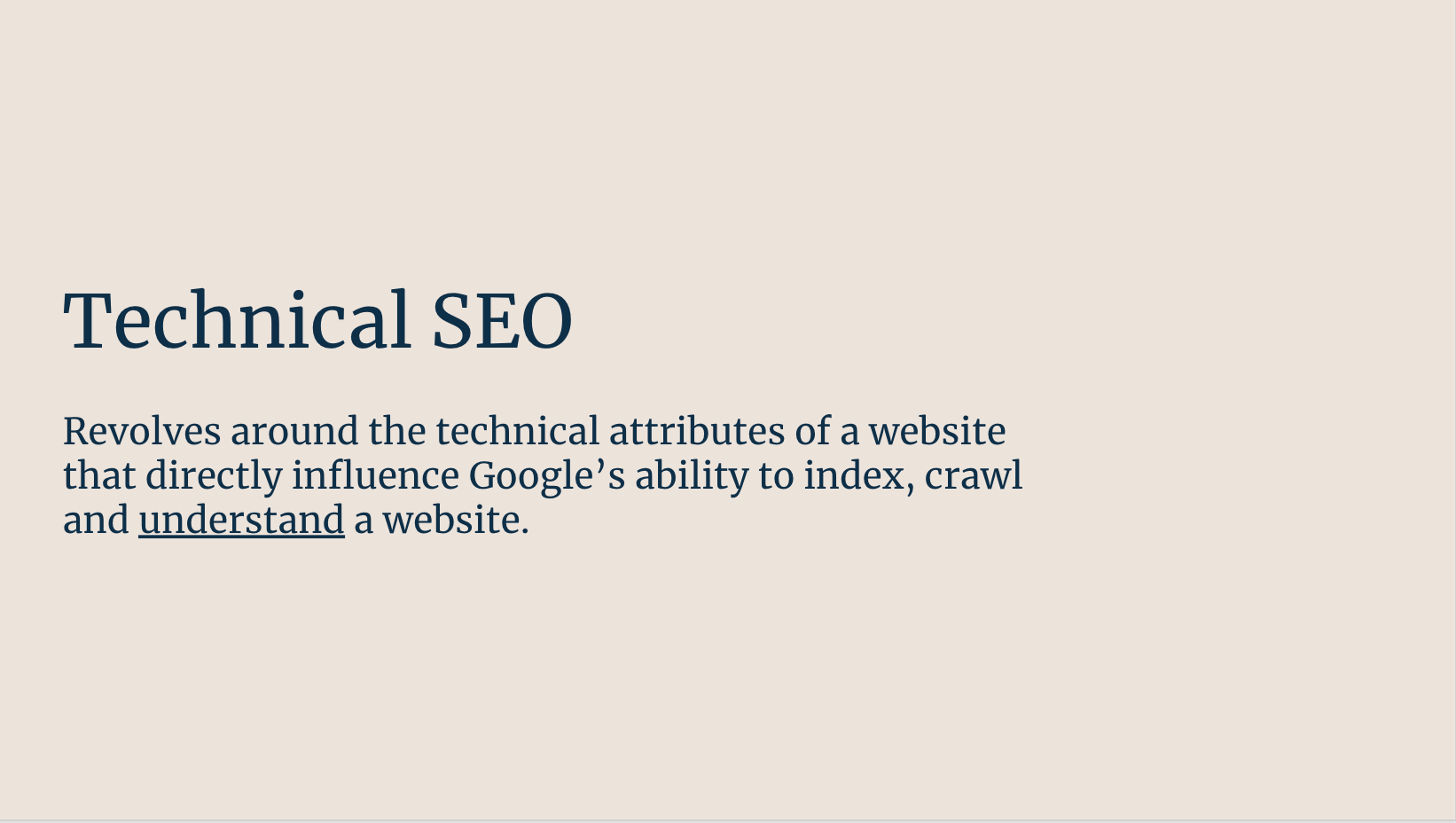
I don't need to tell you; you can just know what your strategy needs to be moving forward. Let's go to the technical SEO, I'm not going to spend much time on it because most of you won't need to do this side. Technical SEO revolves around the technical aspects of a website that directly influence Google's ability to index column understand a website. I highlighted understand because it's very important that Google not only knows you exist; they need to understand what your business is about to properly categorize you. Let's go back to technical SEO and I’ll explain why we won't focus too much time about it. Technical SEO complex chart is about understanding the level of what your website's about.
You brought up a good example earlier. What if I have a company with multiple different services and all stuff? If you are a conglomerate company, who does 50 different things, how does the world understand what page ranks for what? Proper technical SEO implementation provides that. If you internally link the right way, you can tell Google, "I know I have 50,000 pages but these thousand are specifically about this." There's ways to do that. The reason why I won't go into too much detail, technical is technical and don't want to intimidate for and just confused people. Generally, this is only a concern if your website is above 100,000 pages.
If you're a startup that wants to create social media, you want to create, I was thinking back there, an Amazon kind of site, then yes, you're doing this. If you're an insurance calculator, and you're going to get quotes and your life pulling API's and stuff, yes, this. If you are not, then you're not doing any of this. If your most startups, their website's going to be less than 100 pages, nothing to do with it. The reason why I said 100,000, Google has a crawl budget. I don't know the exact number, but I believe Google will crawl every website to 50,000 pages and then start considering if they're going to stop keep going. I believe I might be butchering the number. Regardless, what the number is, your site is probably not that big. I'm not going to spend too much time on that.
If your site is truly that big, we may have a different conversation, but I'm assuming most of you are not going to be needing that. I still have yet to work with somebody who is at that size. Generally, you're more established if you had that many pages. This is what they see is a good crawl structure and everything. Again, I don't want to get too much into detail. Another crawlability thing is, I’ll just put a light example is how you know you have a crawlability issue if you're in this situation. Let's say on the back end of your CMS, you know you have 300,000 pages, you just know, because your CMS tell but Google has only indexed 14,000 pages, we'll just use fullerton.edu, I don't know that's true or not.
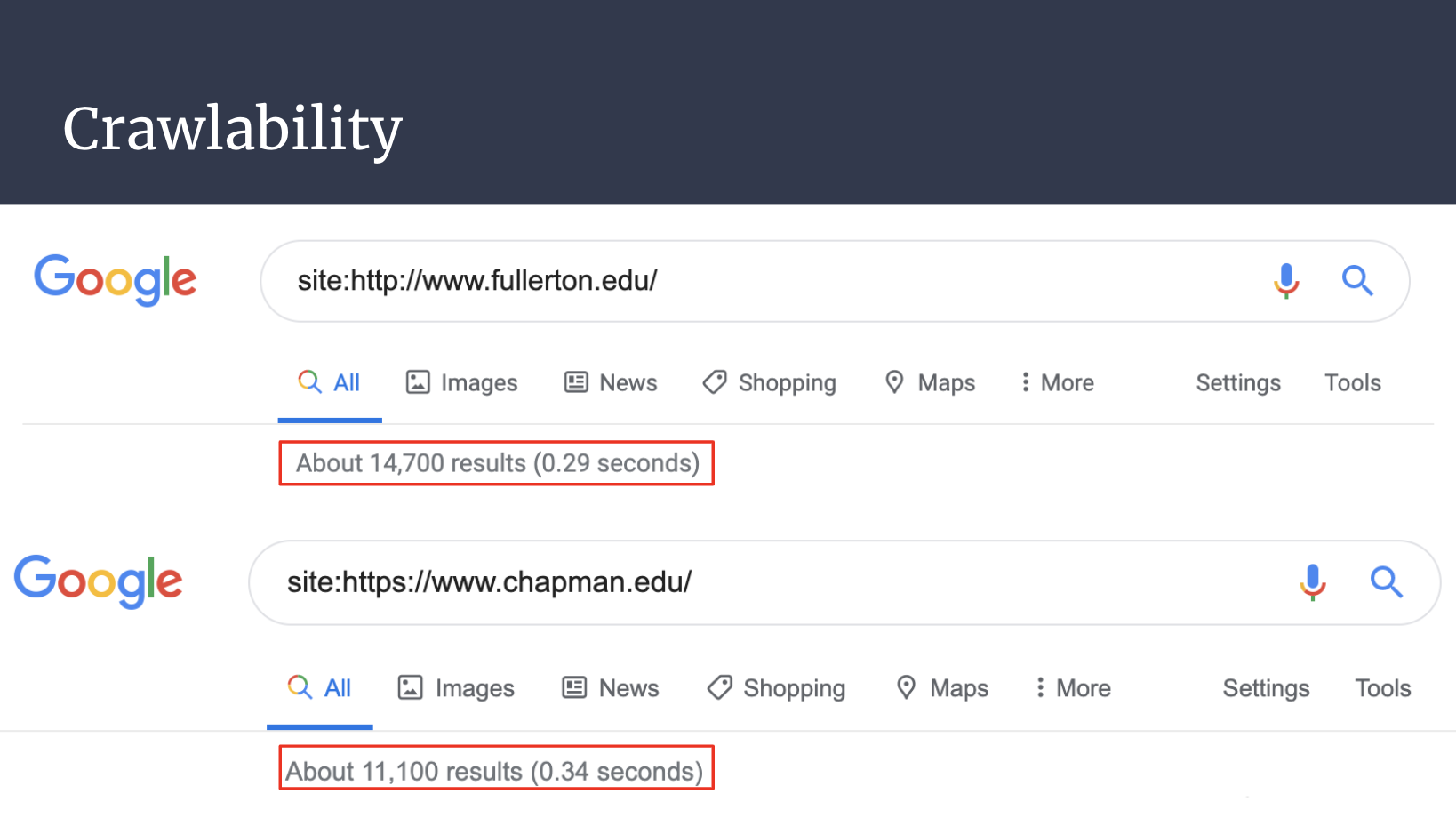
Let's say fullerton.edu, Cal State Fullerton website has 300,000 pages, but your Google index, you check their index, and they say you only have 14,000. You have a Google index problem, because Google knows your site exists, but they're only indexing a small portion of it and there's ways to fix that. Again, most people don't have this issue. This is always the question, when we talk about this. That's probably the reason why I'm not ranking Google is not reading my website and I look at your website, you only have 50 pages that's not an issue. It only becomes an issue when it is just laughable how small portion, Google's indexing of your site. If, let's say your site has 150 pages on the CMS, but Google's indexing 100 of them, Crawlability is probably not the issue.
What I'm talking about is 300,000 pages to 10,000. That's a huge issue. That's that but we won't focus on technical. Again, these are the three pillars in practice, I just want to re summarize this. Content, digital PR and technical. Technical, I don't want you guys to worry about too much. It's a lot of just naming my tags, crawlability. The two that most companies need to worry about is the top two. Digital PR and content strategy. Those really move the needle, any SEO strategy, any SEO company you work with is going to revolve around these two things. What I want to do is I think that we will overlock concepts, it's a little bit technical in the sense that we're rushing right into the SEO stuff.
Scaling Startup SEO Simulations

I want to run through some simulations of data I already have just to show you what typical live clients to deal with.
Simulation #1
Let's go over simulation one. This is simulation one where I have a client who has 15 pages devoted to this topic and they have six referring domains. Competitor three and two have zero referring domains and 21 pages, and two pages, and at number one is just massively. This is a live case scenario of what my client has to deal with. Weirdly enough, they're actually already doing that at number three. What we had to figure out is what we're doing at number three, then we're going to the right path, but just for some reason, we're not ranking. That might be on page, they might have too many videos, there might be a lot of things.
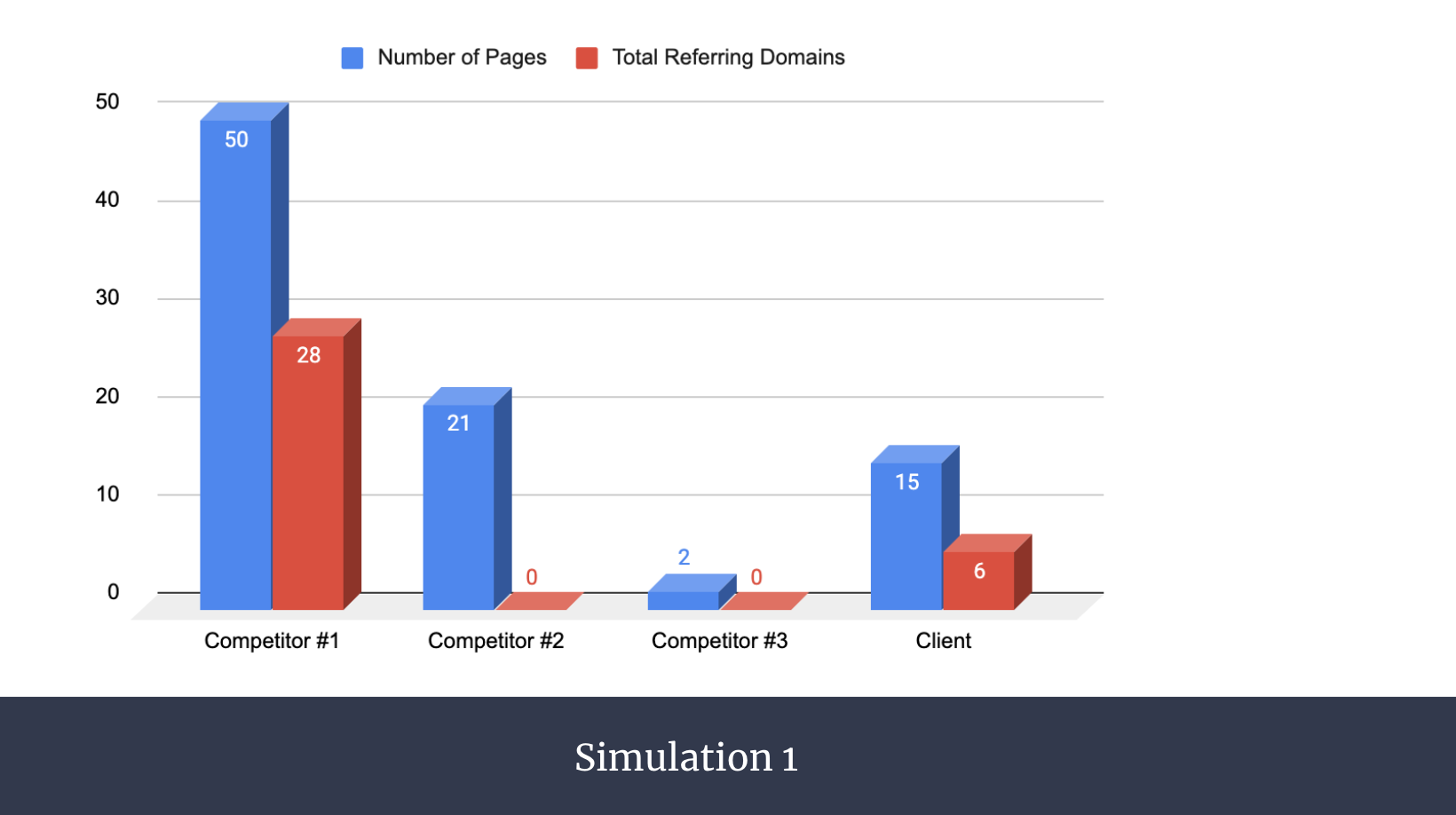
What I want to focus on is content and referring domains. If I was to move forward with this, if I was to recommend a strategy, we already have six referring domains over the two zeros and this is the most difficult to get, I would recommend to client, add more content, unless, like I said, you have referral name contacts, which is going to be very difficult. I would just tell the client, "Up your content because though you have more referring domains and do have a bigger content library, you probably have a better chance if you at least magical surpass content level. Make sense? That's the problem with this stuff. It's not always obvious just because we have more it doesn’t mean we're always out ranking them, but it still gives you that gap. I'll say focus on that, is what I’m saying.
Simulation #2
Simulation number two, what did I have here? Again, client has 18 pages, with zero referring domains. Competitor three has only four pages. That's way less than us, they are 25. 121 referring domains that's just scary, 21. The number one has 12 pages and 12 referring domains. This one's a little bit more obvious. The strategy then is our content library is on par with everybody. If not, one of the highest. There is 21, but we have 18. That's why we couldn’t be better. It's quite obvious that the strategy here is referring domains because we have zero. We need to build links going forward. These are very typical, general, strategic decisions that need to be made.
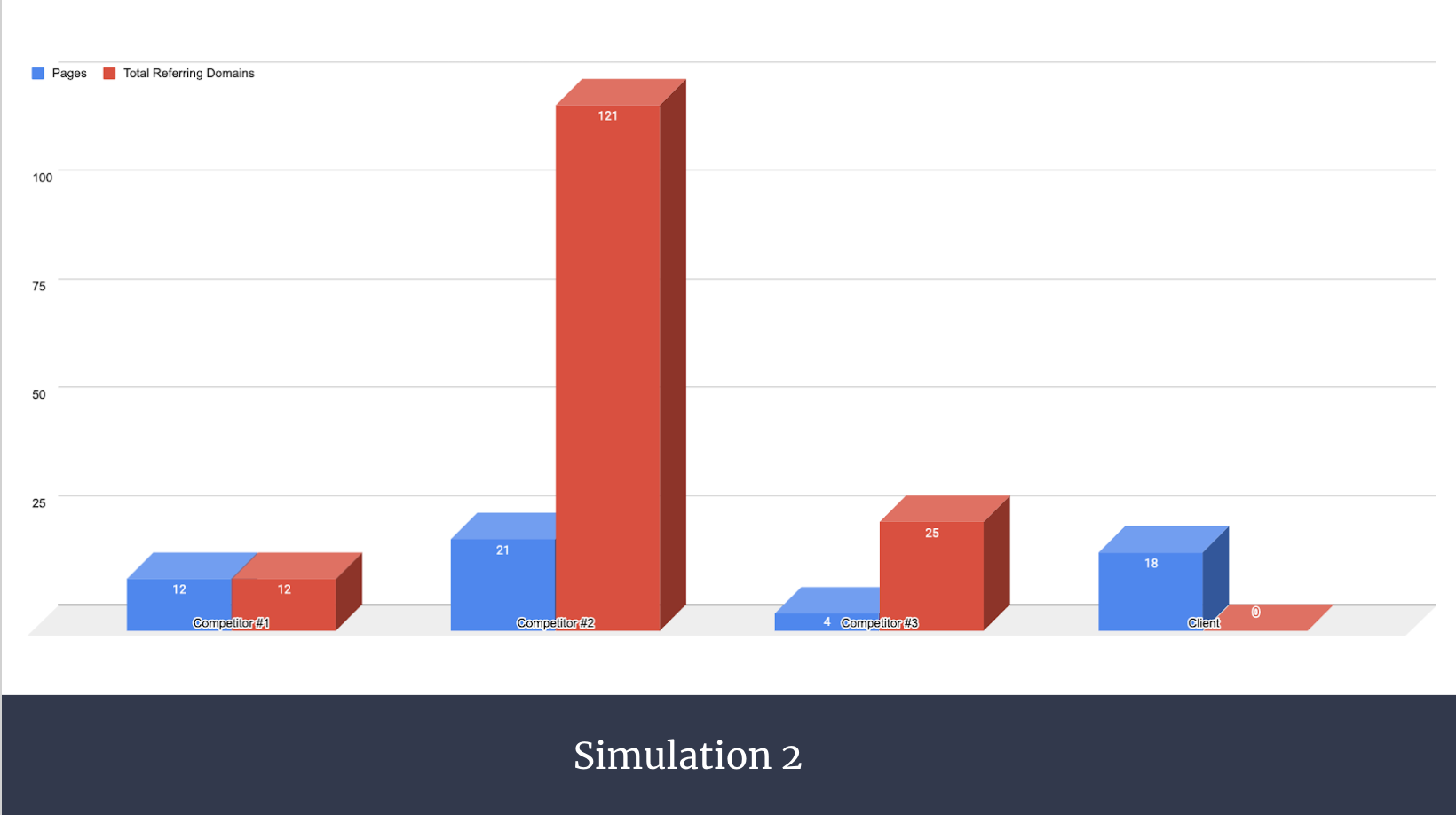
Simulation #3
Simulation number three, I want to show a very complex one, because what I've been doing is over simplifying. I'll to try to do this slowly. This is a client that is going for seven different keywords, and if you're like any other business, you're probably going to do the same. Most companies do not just go for one, they want to go to three, five, seven. The reason is, because let's use a software development company. You don't just do software development, you do app development, you do mobile app development, you do healthcare application development, you do web apps, you do a lot of different things. To silo your SEO just to one is not where you want to be. What I've been showing you prior is easy because we're just assuming I'm a pizza shop and I sell pizza. Well, most startups and businesses here are much more complex than either. That's why I like that you brought up the different services is very complex.
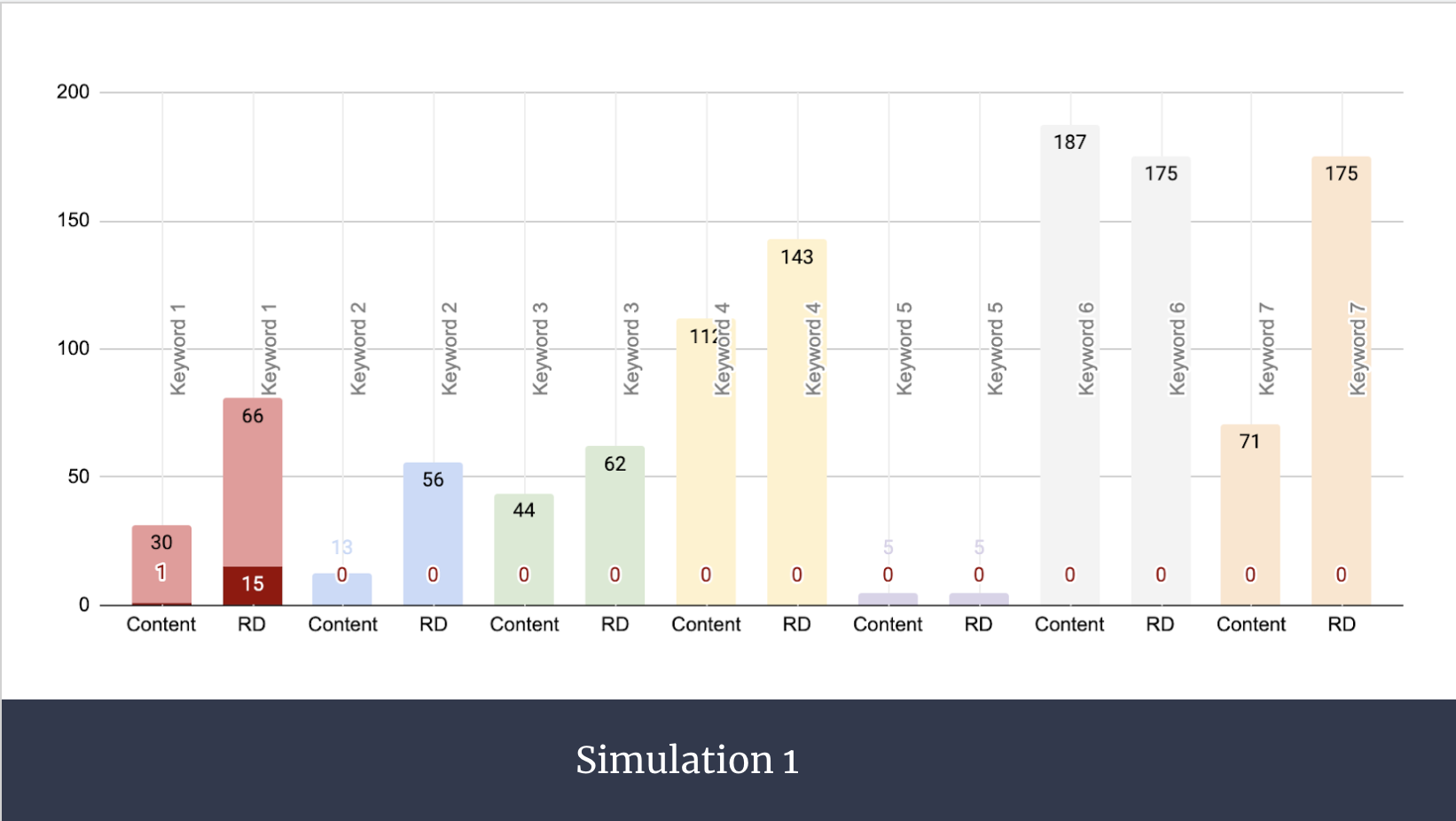
What's hard about that is... I'm going to use a different example. Let's use McDonald's and In-N-Out. They sell McFlurries milkshakes. That's not part of their main business model, but I'm sure for them they want to rank for milkshakes right? Because you want to rank for milkshakes, now you are competing against non-hamburger restaurants, you're competing against other milkshake companies, and it gets very complex. I don't want to scare people but it's just the nature of how business is. Your secondary product, it's someone's main product.
Comment:
Like Dairy Queen, for example.
Jason:
Dairy Queen, right and Dairy Queen, I think they do sell hamburgers. I don't know why but it's there. Anyways, I've never had them, I don’t know if they’re good. Now we have to compete against them. What I want to show you is this, we have seven different keyword depth categories and these are the spreads of every single keyword category we have. On the left is content, on the right is referring domains. What this chart does is it takes the average of our top competitors and gets the average amount of content and the average amount of referring domain and for each keyword category. I specifically want to take a startup.
This is a startup that I work with, and they have big dreams, but they’re a startup, they are very small right now, and they want to rank for seven different keyword categories. Like you mentioned, every keyword category has lots of businesses that their main business model might be that keyword category. Not only are you competing in a void, you are competing in seven different battlegrounds, and you better be ready to compete in every single one of them. The scary thing is, let's say they're like, "We don't care. We want to rank number one for all them." Let's just take content. We need 30, plus 13, plus 44, plus 112, plus zero, zero, plus 187, plus 71. I don’t want to do the math; therefore, I’m going to guess it's 400 pieces of content.
If they want to rank for all seven, they got to make 400 pieces of content at some point and their startup, if I want next year. 400 pieces of content is more than one blog post or page every day. These are realities in SEO, that I'm not trying to scare you about, but when you do SEO, I feel like there is ignorance to it where people think, "I want to rank for everything." If you want to rank for everything, there is a reality. There are other companies whose entire business models are companies based on SEO and they're not going to let you just walk in, with your one little page and be like, "Yeah, you guys rank that." They're not going to do that. They're going to bolster them. You said long term strategy, this keyword category, they have 187, their credit is big gap.
So if anyone enters the market, they have the gap. You can try and do it, but try get 187. That's just content but also the referring domain side. This is a reality for startups. The reason why I was wanting to scaling for SEO is that when you're a startup, you have to figure out what resources and what strengths you have. Hopefully you have something you could work with. For some businesses, he's a founder who's been in the industry for 30 to 40 years, he has all the business contacts, he knows all the journalists. I would tell them, "Don't do a content strategy go a referring domain strategy. You've been in the industry for 30 to 40 years, you know what's cutting edge, you know what people want to see. Focus on creating linkable assets, become a thought leader.
For someone like myself, who when I started out very young in the industry, I stumbled and face planted my way into my own business. I don't have the years of experience and I don't have journalists, I don’t have any of that. For me it's content, I need to scale this. You have to find the way of scaling and it's sweat equity and you got to write every single day, if you do have funds, go hire writers, at creating content machine. There are ways to do but the only way to scale unless you know where you need to be. For my client who is in this one, they don't have the industry context. For them, the reality is media blowing content down. That's the problem. This is just step one. Step two is what happened to their content? That's why you need content.
You can do it yourself, hire the writers to start doing that or you can get a content team, content outsourcing, many different ways to do it. If you are a startup, this is a general reality you would do. Now, what I would tell you though, is if you're a startup, and you don't have the funds, I would actually just focus on one or two. I would just focus on one or two at the beginning because it is much easier to win one, then jump to the next one then jump to the next one. Is you have that ladder. If you go for all seven, it's a shotgun approach and you can be easily intimidated. But I do have clients, I'm telling you who I tell them, I always recommend to clients, "Let's focus on one or two, and go get your own page on one of those then the next one."
I do have clients who go the opposite of that. They say, "I don't care about ranking page one for just one keyword group, I'd rather have all of them on page three, and we'll slowly move down the coast line." This is where SEO stops and your business model comes in. As a business leader, as an executive, as the founder, or just someone who knows your industry, you decide. For this client, the good thing is the three right here are their primary keyword categories, if they win these, their business model will work. These are secondary sources where they got maybe happy, they probably want to be uber successful. Well, the great thing for us is that the secondary sources are very competitive, but the three primary ones are not as much.
So when I sit down with the client, it was an obvious choice that, "Good, we won’t focus too much energy on these, we will focus on these three." You can argue, this is zero, zero... Actually, this is five, five. Five and five here. This one will be really easy to cover, but this keyword category for that client is not even an afterthought. It's like when [inaudible 01:02:12] has got a rounding error. If they got this win, they probably want to go ending their revenue. Just a little slight blah. Even though it's easy, they're not going to go down that route. This is where SEO ends and your business decisions come into play, you as the business team decide at this point.
What I want to discuss is you will have to scale scales as part of SEO, but you need to know what you're scaling for and what you’re going towards. If I don't know how to discuss how to remember this, I don't play fantasy football or basketball or baseball. I played it once got way into it so I've stopped ever since but it's very much like fantasy. You know your spreads, you got to the company spreads. At SEO strategic level that's what's going to be. Everyone has brought good points, not all links are the same. Not all content is made the same. The reason why I will stay for this discussion we're going to ignore that some links are more powerful than others. Because if you have some categories we don't want to over analyze each of them, we just need a general direction to go.
This would give you a good idea. Let's just talk about the simulation. What's the client going to do? There is no answer with this. Like I said, it's down to the business to decide at this point for the business, like I said. That's going to conclude the slides. I didn't want to go too long or too in depth because I feel like that's a lot of info that you need to register. I just want to conclude by saying, again, my name is Jason and that's my email, you can email me if you have any questions. I’m pretty chill with giving advice and stuff when it comes to SEO. I feel like SEO has a bad rap or what a lot of people could call as a lot of spam out there. Because of that, whenever I say someone, "I’m SEO." I get the dirty look, so I just try to do my best to be a model SEO in my industry.
If you have questions, you could email me. I can go on my LinkedIn and connect the three, I'm not very active on LinkedIn, I'm not very active on any social media. That's okay because I'm SEO, I don't have to be active on social media. The best way to contact me is email, and that's that. Other than that, I want to leave the rest for questions. I'm sure everyone has a different website, different questions. I just want to open it up unless you have something that is different.
Questions & Answers
Question:
When you said that there is a website probably like Squrespace, WordPress, did you say that there is one platform that would be the best for SEO or amongst the best?
Jason:
My role is I'm not a developer. I don't think I'm the best to ask, we have developers we can invite and they'll be better but I would say whatever is the easiest for your business. I have worked with people who have had a scheme as it takes. They don't understand well, or the way it's built, it takes a long time to get things out. Actually like one of my clients, they were technical, they were a developing company, but it was taking them a seven-day turnaround to get pages up and we just had a lag of receivers taking too long. I don't think the CMS matters as much as with Squarespace or WordPress, as long as it has general SEO tag abilities, and then you can get out of this.
If you were to ask me which one I've seen most clients with the most success use, generally it's WordPress. Wix is a pay to play with SEO, it's free with its add SEO status you get to pay for stuff. And Squarespace, my personal website's on Squarespace, my personal one. I like it because Squarespace is very visual. In terms of SEO it's fine, but it's definitely made for design and not SEO. Where I think, I heard you mention earlier, WordPress SEOs makes life 10 times easier because the plugin is easy to use and it's got a lot of stuff. I say WordPress, but also, I’m no developer and there's no correlation between, if your hard work is priced, it's better for SEO.
Most of that is debunked, it's just about what gives you the most agile way of moving, but that's actually it. If you're a Squarespace expert, then go that route.
Question:
What is a meta tag in terms of importance to SEO?
Jason:
Yeah. Meta tags is again, very important. A quick rundown. There are three main SEO tags, title tags, meta descriptions, and then SEO tags or meta tags. Meta tags and SEO tags I think it was back in 2008 Google had to stop reading them. 2008. They officially said, "We do not read those tags. Do waste any time trying to figure out those tags. It's only the title tag the meta description." Those are the only two that really matter for you. They actually, SEO title tags and meta description are very important. Again, that's going to be in my first presentation, you should go watch that one. Those are so basic one on one thing, origins of a technical SEO, but you should go watch the first presentation, those are the important ones. Did that answer your questions? Any questions?
Question:
Once a client engages you, I presume you do some kind of an audit, and other than the pages and their backlinks, what else are you looking at?
Jason:
Yeah. What I'm looking for is those title tags and if they're set up correctly. You'd be surprised how many times they are not set up correctly. I will look at SEO title tags. Again, that was presentation one, I'll look at page speed. If page speed is super slow, that's a problem. I will look at the last time that they've updated their website. Generally, it's around those. There are technical issues and stuff but generally, like I said, those pillars will give you a good understanding. Well, I will answer your question a little bit further though. When someone comes to me and they want to engage in SEO, actually, ironically, the problem isn't the SEO, the problem is they don't know what keywords they should be going for, the keywords that they think they should be going for those aren’t really keywords.
I don't think I can go over that too much in my first presentation. Shameless plug, it's on my blog, I run a keyword research guide. A lot of people go for semantically the right word, but the incorrect search term. The infamous example I love to use is I work a lot with dentists, when I would sit down with dentists, I'd be like... I actually wouldn't tell. They would just tell me, "Jason, I want to rank of cavity." Which makes sense because it's a problem and there's a solution. Have you ever googled the word cavity? It does not return consumer commercial intent, you will get Wikipedia, colgate.com defined cavity but you won't find anything that helps you fill the cavity. A dentist... Let me take a step back.
Because of Wikipedia, Colgate, and these websites are ranking for cavity as a definition based or informational based is a national global play. You are now competing against Colgate, Wikipedia who are global companies. Your California, Orange County Irvine dental practice, it will take you years to outrank Colgate. It's a huge amount of resources, you probably don't have. A better keyword for you to rank for, not very imaginative is dentist, in Uber. That doesn't sound very sexy, but why would you want to rank for county, because it's not the right keyword. That's generally what the main problem is. They want to go for keywords that are just not the right content. Another good example, I was talking with someone from this building who was very interesting.
He had a startup that's going to sell frozen Korean dumplings. You would think we should rank for Korean dumplings, when you go Google that, and it's all recipes. Why would a frozen dumpling want to rank for recipes? Generally, the issue is not what's on the site, it's the direction. Yeah, it sounds stupid but it's like any physical trainer or whatever to them with questions like, “This is what I want." Then you have to do a zoom out, is that the right goal though? Is that really the meaning of happiness? Same thing with SEOs, something like that.
Question:
Any thoughts on using an open platform to grow content on one site?
Jason:
Yes, if you can do that that's the best actually. Because then it grows without you needing to do anything and that gets more into the technical side. If you can do that... They call user generated content, the dream of every website. Every website wants to do user generated content, it's very difficult, but if you can, ignore everything I've been talking about. Go down that route. To be successful with it is extremely difficult because you need to have enough user generated content, where it's just like Reddit or Facebook, it's just so much, it's overwhelming. if you're going to use user generated content where you have someone post something once every two weeks, it's not.
Question:
How would that be different then when you were saying that social media links don't help towards ranking?
Jason:
Good question. Okay. The reason why social media doesn't count is because we're talking strictly the links on that section, in that term. When talking about user generated content, we're not talking about links we're just talking about content on your own website. That's why that works. But in terms of a link it doesn't really matter. Does that make sense? Yeah.
Question:
Actually I have a question for social media. Let's say you have a basic content on your website where there's just some type of word on there where you only have a few pages, you don’t have a big bang but you have almost like a traffic strategy where you're posting on no-follow sites like Instagram, and you get hundreds of thousands of people coming in. Does that play in at all?
Jason:
Yeah. Let me give you the good answer then I'll give you a smarter alecky answer.
The first answer it does help. Traffic coming into your website is a small SEO sign with a good SEO sign so it will help. If Google sees a lot of traffic coming to your site and people stay, then it will help you. The Smart alecky answer is you don't need to worry about SEO then if you have a hundred thousands of different visitors. That's the smart key answer. You know what I mean. It does help SEO.
Question:
Away from startups, are products more successful or services?
Jason:
That's a great question that I think it's beyond the realm of SEO. I would say, this is more- Yeah. The hard SEO ties in it. Okay. Services I find have an easier time SEO wise, because services generally have a bigger ticket revenue cap for sale. If you're doing a service for $5 I don’t know why you’re doing that service, but if you're doing a service, I would say the average service I see in the market is, I don't know, 100 to 500 bucks an hour. It's much more conducive for a business to invest in the SEO if they get three sales and each one's $1,000 each. The return was easier than if you sell a product for $2. Then you sell a lot of... It's harder for startups to stomach $2,000, $3,000 per month investment when they're per item sells are $2 $5.:
I'm not saying that they're not successful, but I find that the founders of startups that just sell products, there's much more a headache because their nerves get to them, they're like, "Why do I spend so much if this particular item is not as good?" Let me give you another comparison. You saw with the restaurants and back then I used to charge 750 a month for SEO, I don't charge nearly as low as I used to. 750 a month for restaurants. Let's just use one of the restaurants I had for five years and he and I are still good friends today. He's actually alumni from here.
He would have to sell I think 200 burritos to warrant the cost of that, and a restaurant just selling 200 burritos just sounds a lot, whereas like a dentist, I would need to sell one patient to come in and they would pay for the entire retainer. That's why I would say services tend to have an easier time SEO, not because they're better for SEO it's just the thought process. Now there's no other... Yes.
Question:
You said that you usually check for page speed when doing the audit, what's the correlation between page speed and ranking?
Jason:
My words are escaping. It's like there's a minimum, you need to pass the minimum. As long as you pass the minimum, then generally it's equal playing field. Because your site is extremely fast, doesn't mean you're going to rank down so fast, but if your site is just frustratingly slow then you... It's more of a penalty thing than a benefit. There's a free PageSpeed tool from Google, it's called Google PageSpeed Insights, just type in Google PageSpeed and it will tell you the speed. Something that a lot of people don’t realize is mobile is more important to desktop, check your mobile speed. Here's another thing that I suppose a lot of people don't factor in. Don't just check your homepage, in PageSpeed, you'd be surprised how many people only check their homepage.
Check all the important pages like your product pages and service pages. Those are also very important. I've seen websites where the homepage is really fast, but every other page was really slow. That's not good. Any other questions? Anything SEO related or entrepreneur related? Yes.
Question:
I'm curious how the SEO applies through apps.
Jason:
Yes. There is, it's called ASO, which is App Store Optimization, that's completely different from SEO, I don't know anything about it. I think ASO is a very small field. SEO is good for apps in that, People do Google things and then they will download the app. I definitely think SEO is worth it for apps. I the other day, it's funny being an SEO because when I fall for my own SEO tactics I hate it, but I just have to. I am very big on productivity. I googled a productivity concept and an app ranked for that productivity concept, there was a blog post about it. I read the blog post, I liked it, and they were like, "By the way, our app helps with that." I was like, "Let me sign up for a free trial."
And now I'm a paying member of this app, just because the stupid blog post ranked really well for that one-minute search, it does play a factor.
Cool. Any other questions? I'm happy to answer anything. No more questions. Alright, if that is all the questions, I will be around... What time is it? Does anyone know? I will be here till eight, so if you have any questions, you can come up. Again, my contact info is here. I have my business card. Let me put them over here. I was ready to pass them out. My business card is here. My business card has my personal email. It looks different from that one. Whichever one you want to email, I’ll respond to, it's mine.
Question:
What was that keyword article that you said you made the keyword research article?
Jason:
Look at my blog, I don’t have any blogpost on my website. My blog, I do update. I have to take my own advice and I had to write a blog post to make my site bigger. You think doing SEO is not for your business if you’re doing SEO against other SEO agencies, you're literally doing SEO against the best of the best. I have to constantly make content and get referring domains and stuff. Yeah. There's a lot of things that you will go home with, we had a lot of questions. You’re probably going to go home and be like, "Hey, I don’t know any more links." Then you'll be like, "How do I get those links?" You can email me and we could talk about those things. Are we good?

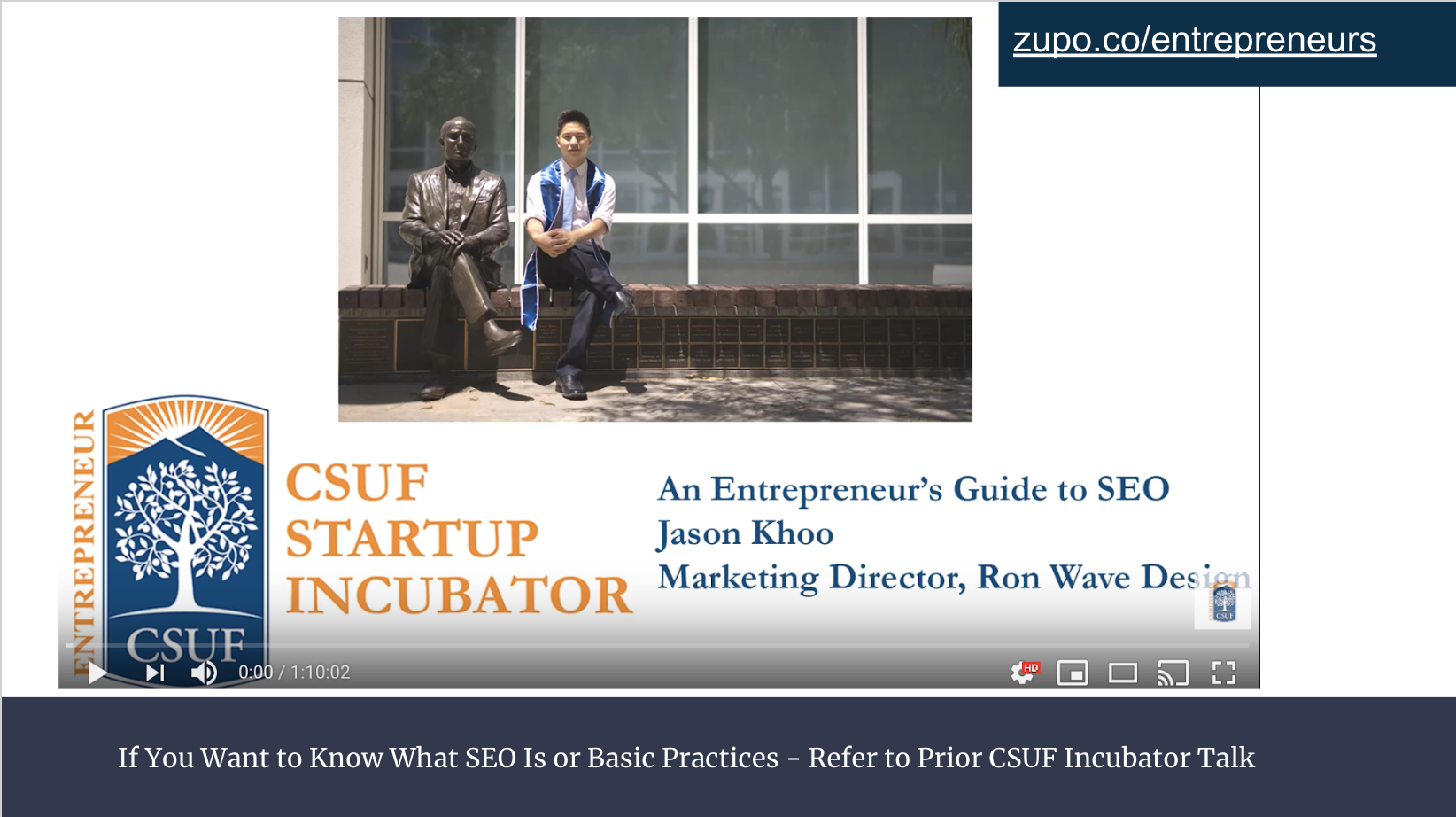
0 comments